
Title: Five Minute Stories
Author: Laura Elizabeth Howe Richards
Illustrator: Etheldred B. Barry
Albertine Randall Wheelan
Release date: August 21, 2015 [eBook #49748]
Most recently updated: October 24, 2024
Language: English
Credits: Produced by Suzanne Shell, Emmy and the Online Distributed
Proofreading Team at http://www.pgdp.net (This file was
produced from images generously made available by The
Internet Archive/American Libraries.)

“Mrs. Richards has made for herself a little niche apart in the literary world, from her delicate treatment of New England village life.”—Boston Post.
“Seldom has Mrs. Richards drawn a more irresistible picture, or framed one with more artistic literary adjustment.”—Boston Herald.
“A perfect literary gem.”—Boston Transcript.
“Each is a simple, touching, sweet little story of rustic New England life, full of vivid pictures of interesting character, and refreshing for its unaffected genuineness and human feeling.”—Congregationalist.
“They are the most charming stories ever written of American country life.”—New York World.
“Had there never been a ‘Captain January,’ ‘Melody’ would easily take first place.”—Boston Times.
“The quaintly pretty, touching, old-fashioned story is told with perfect grace; the few persons who belong to it are touched in with distinctness and with sympathy.”—Milwaukee Sentinel.
A charming idyl of New England coast life, whose success has been very remarkable. One reads it, is thoroughly charmed by it, tells others, and so its fame has been heralded by its readers, until to-day it is selling by the thousands, constantly enlarging the circle of its delighted admirers.
The title most happily introduces the reader to the charming home-life of Dr. Howe and Mrs. Julia Ward Howe during the childhood of the author.
With true literary touch, she gives us the story of some of the salient figures of this remarkable period.
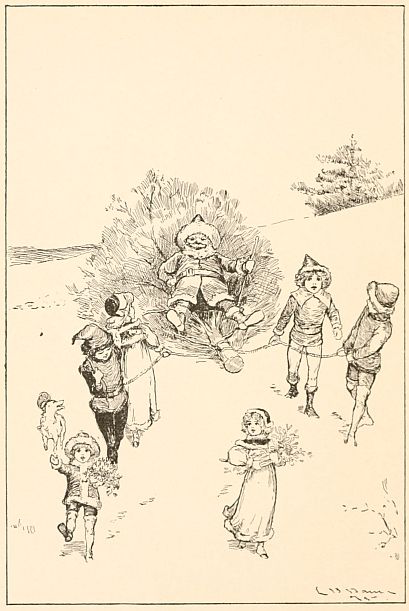
| PAGE | |
| Dedication | vii |
| Betty | 15 |
| Two Calls | 16 |
| A New Year Song | 19 |
| New Year | 20 |
| A Lesson Song | 24 |
| The Rubber Baby | 26 |
| The Red, White and Blue | 28 |
| Totty’s Christmas | 29 |
| A Certain Boy | 32 |
| The New Sister | 33 |
| Buttercup Gold | 35 |
| One Afternoon | 42 |
| The Stove | 43 |
| John’s Sister | 44 |
| New Year Song | 45 |
| What Was Her Name | 46 |
| A Lesson Song | 49 |
| The Patient Cat | 52 |
| Mathematics | 53 |
| By the Fading Light | 55 |
| Tobogganing Song | 58 |
| Song of the Tilt | 59 |
| The Lazy Robin | 60 |
| The Boy’s Manners | 62 |
| Merry Christmas | 66 |
| Rinktum | 67 |
| In the Tunnel | 69[x] |
| Practising Song | 71 |
| Queen Elizabeth’s Dance | 72 |
| A Storming Party | 74 |
| At the Little Boy’s Home | 75 |
| Then and Now | 76 |
| Pleasant Walk | 78 |
| A Great Day | 80 |
| A Pastoral | 82 |
| Riches | 84 |
| Poverty | 85 |
| The Best of All | 87 |
| A Study Hour | 89 |
| The Young Ladies | 90 |
| The Weathercock | 92 |
| Ichthyology | 93 |
| A Happy Morning | 98 |
| Lilies and Cat-Tails | 99 |
| The Metals | 104 |
| The Howlery Growlery Room | 109 |
| The Speckled Hen | 113 |
| The Money Shop | 116 |
| A Long Afternoon | 121 |
| The Jacket | 122 |
| The Fireworks | 124 |
| Jingle | 126 |
| See-Saw | 127 |
| Nancy’s Nightmare | 129 |
| Amy’s Valentine | 131 |
| Once Upon a Time | 133 |
| The Pathetic Ballad of Clarinthia Jane Louisa | 134 |
| A Day in the Country | 135 |
| Goosey Lucy | 136 |
| Goosey Lucy’s New Year’s Calls | 139 |
| Three Little Birds | 142 |
| The Quacky Duck | 143 |
| New Year Thoughts | 144 |
| Nonsense | 145 |
| The Singular Chicken | 147[xi] |
| The Clever Parson | 148 |
| The Purple Fish | 155 |
| Mr. Somebody | 157 |
| A Christmas Ride | 159 |
| A Funny Fellow | 161 |
| Woffsky-Poffsky | 162 |
| April and the Children | 163 |
| The Snowball | 165 |
| A Great Fight | 168 |
| Hallelujah! | 171 |
| Lullaby | 172 |
| Merry Christmas | 173 |
| The Little Dog with the Green Tail | 175 |
| Naughty | 180 |
| Hard Times | 180 |
| On the Steeple | 183 |
| Naughty Billy | 184 |
| A Lad | 184 |
| Saint Valentine’s House | 185 |
| The Gentleman | 187 |
| A Leap Year Boy | 190 |
| King Pippin | 193 |
| The Story of the Crimson Crab | 194 |
| Mother’s Riddle | 196 |
| King John | 197 |
| The Spotty Cow | 198 |
| The Button Pie | 199 |
| The Inquisitive Ducks | 200 |
| Queen Matilda | 202 |
| The Two-Shoes Chair | 203 |
| Ethelred the Unready | 205 |
| Poor Bonny | 205 |
| The Husking of the Corn | 209 |
| The Clever Cheese-Maker | 211 |
| The Spelling Lesson | 214 |
| The Person who Did Not Like Cats | 216 |
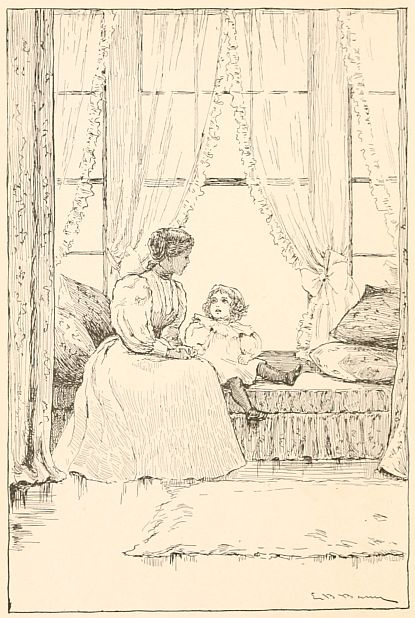
Beau Philip and Beau Bobby stood side by side on the doorstep of their father’s house. They were brothers, though you would hardly have thought it, for one was very big and one was very little.
Beau Philip was tall and slender, with handsome dark eyes, and a silky brown moustache which he was fond of curling at the ends. He wore a well-fitting overcoat, and a tall hat and pearl-gray kid gloves.
Beau Bobby was short and chubby, and ten years old, with blue eyes and yellow curls (not long ones, but funny little croppy locks that would curl, no matter how short he kept them). He wore a pea-jacket, and red leggings and red mittens.[17]
There was one thing, however, about the two brothers that was just the same. Each carried in his hand a great red rose, lovely and fragrant, with crimson leaves and a golden heart.
“Where are you going with your rose, Beau Bobby?” asked Beau Philip.
“I am going to make a New Year’s call,” replied Beau Bobby.
“So am I,” said Beau Philip, laughing. “We may meet again. Good-by, little Beau!”
“Good-by, big Beau!” said Bobby, seriously, and they walked off in different directions.
Beau Philip went to call on a beautiful young lady, to whom he wished to give his rose; but so many other people were calling on her at the same time that he could only say “good-morning!” to her, and then stand in a corner, pulling his moustache and wishing that the others would go. There were so many roses in the room, bowls and vases and jars of them, that he thought she would not care for his single blossom, so he put it in his buttonhole; but it gave him no pleasure whatever.
Beau Bobby trotted away on his short legs till he came to a poor street, full of tumble-down cottages.
He stopped before one of them and knocked at the door. It was opened by a motherly looking Irish woman, who looked as if she had just left the washtub, as, indeed, she had.
“Save us!” she cried, “is it yersilf, Master Bobby? Come in, me jewel, and warm yersilf by the fire! It’s mortal cowld the day.”
“Oh, I’m not cold, thank you!” said Bobby. “But I will come in. Would you—would you like a rose, Mrs. Flanagan? I have brought this rose for you. And I wish you a Happy New Year. And thank you for washing my shirts so nicely.”[18]
This was a long speech for Beau Bobby, who was apt to be rather silent; but it had a wonderful effect on Mrs. Flanagan. She grew very red as she took the rose, and the tears came into her eyes.
“Ye little angil!” she said, wiping her eyes with her apron. “Look at the lovely rose! For me, is it? And who sint ye wid it, honey?”
“Nobody!” said Bobby. “I brought it myself. It was my rose. You see,” he said, drawing his stool up to the little stove, “I heard you say, yesterday, Mrs. Flanagan, when you brought my shirts home, that you had never had a New Year’s call in your life; so I thought I would make you one to-day, you see. Happy New Year!”
“Happy New Year to yersilf, me sweet jewel!” cried good Mrs. Flanagan. “And blessings go wid every day of it, for your kind heart and your sweet face. I had a sore spot in my heart this day, Master Bobby, bein’ so far from my own people; but it’s you have taken it away this minute, wid yer sweet rose and yer bright smile. See now, till I put it in my best chiny taypot. Ain’t that lovely, now?”
“Isn’t it!” cried Beau Bobby. “And it makes the whole room sweet. I am enjoying my call very much, Mrs. Flanagan; aren’t you?”
“That I am!” said Mrs. Flanagan. “With all my heart!”
The little sweet Child tied on her hood, and put on her warm cloak and mittens. “I am going to the wood,” she said, “to tell the creatures all about it. They cannot understand about Christmas, mamma says, and of course she knows, but I do think they ought to know about New Year!”
Out in the wood the snow lay light and powdery on the branches, but under foot it made a firm, smooth floor, over which the Child could walk lightly without sinking in. She saw other footprints beside her own, tiny bird-tracks, little hopping marks, which showed where a rabbit had taken his way, traces of mice and squirrels and other little wild-wood beasts.
The Child stood under a great hemlock-tree, and looked up toward the clear blue sky, which shone far away beyond the dark tree-tops. She spread her hands abroad and called, “Happy New Year! Happy New Year to everybody in the wood, and all over the world!”
A rustling was heard in the hemlock branches, and a striped squirrel peeped down at her. “What do you mean by that, little Child?” he asked. And then from all around came other squirrels, came little field-mice, and hares swiftly leaping, and all the winter birds, titmouse and snow-bird, and many another; and they all wanted to know what the Child meant by her greeting, for they had never heard the words before.
“It means that God is giving us another year!” said the
Child. “Four more seasons, each lovelier than the last, just as
it was last year. Flowers will bud, and then they will blossom,
and then the fruit will hang all red and golden on the branches,[21]
[22]
[23]
for birds and men and little children to eat.” “And squirrels,
too!” cried the chipmunk, eagerly.
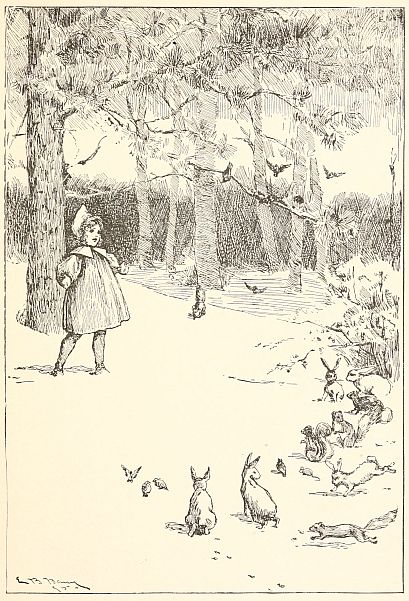
“Of course!” said the Child. “Squirrels, too, and every creature that lives in the good green wood. And this is not all! We can do over again the things that we tried to do last year, and perhaps failed in doing. We have another chance to be good and kind, to do little loving things that help, and to cure ourselves of doing naughty things. Our hearts can have lovely new seasons, like the flowers and trees and all the sweet things that grow and bear leaves and fruit. I thought I would come and tell you all this, because sometimes one does not think of things till one hears them from another’s lips. Are you glad I came? If you are glad, say Happy New Year! each in his own way! I say it to you all now in my way. Happy New Year! Happy New Year!”
Such a noise as broke out then had never been heard in the wood since the oldest hemlock was a baby, and that was a long time ago. Chirping, twittering, squeaking, chattering! The wood-doves lit on the Child’s shoulder and cooed in her ear, and she knew just what they said. The squirrels made a long speech, and meant every word of it, which is more than people always do; the field-mouse said that she was going to turn over a new leaf, the very biggest cabbage-leaf she could find; while the titmouse invited the whole company to dine with him, a thing he had never done in his life before.
When the Child turned to leave the wood, the joyful chorus followed her, and she went, smiling, home and told her mother all about it. “And, mother,” she said, “I should not be surprised if they had got a little bit of Christmas, after all, along with their New Year!”



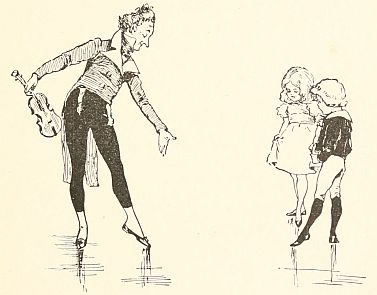
The ascent of the Rubber Baby took place in the back yard on the afternoon of last Fourth of July. It was an occasion of great interest.
We were all in the yard,—Mamma, Papa, Tubby, Toots, Posy, Bunny, Bay and Mr. Bagabave. (This boy has another name, but he prefers Mr. Bagabave because he made it himself.)
There was also the best cousin, who is nine feet tall, more or less, and a kind gentleman who was a friend of the best cousin, and came to see that he did not hurt himself with the firecrackers.
Well, there we all were, and we fired crackers and torpedoes the whole afternoon without stopping. The best cousin and the kind gentleman did it to amuse the children, and the rest of us did it to amuse ourselves.
We had cannon-crackers a foot long; we had double-headers, which papa threw up in the air, oh, ever so far, so that they exploded long before they reached the ground. Then there were dear little crackers, very small and slender, just made for Bay, though it is quite strange that the Chinese people should have known about her, when she is so very young.
Now we fired off single crackers, great and small, with a bang and a bang and a bang-bang; then we put a whole bunch under a barrel, and they went snap, crack, crickety, crackety. Yes, it was delightful.
But Papa, who has lived long and fired many crackers, began to pine for something new, and he said, “Let us have an ascension!”
Then we took counsel, and Mr. Bagabave said, “We will send[27] up the Rubber Baby.” Now the Rubber Baby belonged to Bay, and she loved him; but when Bunny and Mr. Bagabave told her what a fine thing it was to get up in the world, and how many people would like to go up farther than the Rubber Baby would go, Bay consented, and went and brought the Rubber Baby, who smiled and thought little of the matter.
Then Papa brought the biggest cannon-cracker of all, and made a long fuse for it, and set it up in the ground; and over it he put a tomato can, and on the tomato can he set the Rubber Baby.
Now all was ready, and we all stood waiting for the final moment. I do not know what were the thoughts of the Rubber Baby at this moment, but we were all in a state of great excitement.
“Get out of the way, children!” cried Papa. “Run away, Bay! Get behind the maple-tree, Mr. Bagabave! She’s going. Now, then! One, two, three, and away!” and Papa touched off the fuse.
A moment of great suspense, a tremendous report, a dense cloud of smoke. Up soared the Rubber Baby, higher than the top of the big maple-tree, almost to the very clouds (or so Bay thought).
We watched in silent rapture; then, as the intrepid air-traveller came down, still smiling, a loud cheer broke from the whole crowd.
No, not from the whole crowd; there was one exception. The kind gentleman who came to keep the best cousin from hurting himself gave a howl so loud and clear that we all started, and ran to see what was the matter.
The poor gentleman had been holding a cannon-cracker, which he was going to fire just when Papa gave the signal for sending off the Rubber Baby. In the excitement of the moment[28] he forgot the cannon-cracker, and it went off in his hand, and burnt him quite badly.
We were all very sorry, not only for the poor gentleman’s own sake, but because now there was no one to see that the best cousin did not hurt himself.
A pretty young lady came, and tied up the poor gentleman’s hand so nicely with her soft handkerchief that he said he was glad the cracker had gone off in it.
The Rubber Baby said nothing, but sat still in the middle of the gravel walk. Perhaps it was waiting to see if some lovely young lady would come to cheer and comfort it; but no one came till little Bay took it up, wiped off the dust and powder, kissed it, and put it to bed.
Dorothy was all dressed to see the Fourth of July procession. She had on her white dress, her blue sash, and her red shoes. Her cheeks were red, too, and her eyes were blue, and when she pushed up her full muslin sleeves, she saw how white her fat little arms were as soon as you got past the sunburn. “I’se red, white and blue mine-self!” said Dorothy.
She went and stood on the top doorstep, which was very near the street. Pretty soon the trumpets began to sound and the drums to beat, first far away, then nearer and nearer. At last the procession came round the corner. First the drum-major, with his huge bearskin cap, tossing his great gilded stick about; then came the musicians, puffing away with might and main at their great brass horns and trumpets, and banging away at their[29] drums and kettle-drums. It was a splendid noise; but they were really playing a tune, the “Red, White and Blue.”
The standard-bearer dipped his flag as he passed Dorothy’s house, for there was a great flag draped over the doorway, and red, white and blue streamers running up to the windows, and Dorothy waved a little flag as she stood on the top doorstep. “Three cheers for the red, white and blue!” sang the soldiers as they marched by.
“Sank you!” said Dorothy, spreading out her frock and patting her sash. “I’se the red, white and blue! See mine sash!”
The soldiers laughed and cheered.
Then came a soldier who looked straight up at Dorothy, and held out his arms, though without stopping. And it was Dorothy’s own Papa!
In less than half a minute Dorothy was in his arms, and he had caught her up, and put her on his shoulder.
Dorothy waved her flag, and jumped up and down on Papa’s shoulder, and cried, “Three cheers for the red, white and blue! three cheers for me!” and all the soldiers shouted and cheered and laughed, and so Dorothy and the procession went on their way all through the village.
They call me Totty, because I am small. I had a funny Christmas, and Mamma said I might tell about it.
I have the scarlet fever, and I live all alone with my Mamma in her room. Nobody comes in ’cept the doctor, and he says he sha’n’t come any more to see a girl who feels as well as I do.[30]
Mamma wears a cap and an apron, and we have our own dishes, just like play, and she washes them in a bright tin pan, and then I have the pan for a drum, and beat on it till she says she shall fly.
I always stop then, for I do think I should be frightened to see Mamma fly. Besides, she might fly away.
Well, yesterday was Christmas, and I could get out of bed and sit up in a chair; it was the first time.
So I sat up to dinner, and it was a partridge, but we played it was a turkey. There was jelly and macaroni, and for desert we had grapes and oranges. Mamma made it all look pretty, and Papa gave her roses through the door, and she put them all over the table.
When she had washed the dishes, she turned the big chair round so that I could look out of the window, and Hal and John came out on the lawn and made a snow-man for me to look at.
It was a fine man, with two legs and two arms, and they kept playing he was the British, and knocking his head off.
Mamma told me I mustn’t turn round till she said I might, but I didn’t want to, anyhow, the man was so funny.
I heard Papa whispering at the door, and I did want to see him, but I knew I couldn’t, ’cause the other children haven’t had the fever: and then I heard things rustle, paper and something soft, like brushing clothes.
They went on rustling, oh, a long time! and there was jingling, too, and I began to want to turn round very much indeed; but I didn’t, of course, ’cause I said I wouldn’t.
At last Mamma came up softly and tied something over my eyes, and told me to wait just a minute; and it really did not seem as if I could.
Then she turned the chair round, and took the thing off my eyes, and—what do you think was there?[31]
A Christmas tree! A dear little ducky tree, just about as big as I am, and all lighted with red and blue candles, and silver stuff hanging like fringe from the branches, and real icicles. (No! Mamma says they are glass, but they look real. They are in a box now, and I can play with them.)
And everything on the tree was for me. That makes a rhyme. I often make them.
There was a lovely doll, all china, with clothes to take off and put on, and buttons and buttonholes in everything. I have named her Christine, because that is the most like Christmas of any name I know.
And a tin horse and cart, and a box of blocks, and a lovely white china slate to draw on, and a box of beasts, not painted, all carved, just like real beasts, and a magnet-box, with three ducks and two swans and four goldfish and a little boat, all made of tin, and lots of oranges and a lovely china box full of cream candy (the doctor said I might have it if Aunt May made it, and she did), and a box of guava jelly, and a little angel at the top, flying, all of white china.
And everything will wash except the things to eat, ’cause everything I play with has to be burned up, unless it can be washed, so they all gave me washing things.
Even Christine has china hair, and all her clothes are white, so they can be boiled, and so can she, and Mamma says it won’t hurt her at all.
So I never had a nicer Christmas, though, of course, I wanted the other children; but then, I had Mamma, and of course they wanted her, poor dears!
And nobody need be afraid to read this story, ’cause it is going to be baked in the oven before it is printed.
“Look carefully!” said the kind Nurse, turning down a corner of the flannel blanket. “Don’t touch her, dears, but just look.”
The children stood on tiptoe and peeped into the tiny red face. They were frightened at first, the baby was so very small, but Johnny took courage in a moment.
“Hasn’t she got any eyes?” he asked. “Or is she like kittens?”
“Yes; she has eyes, and very bright ones, but she is fast asleep now.”
“Look at her little hands!” whispered Lily. “Aren’t they lovely? Oh, I do wish I could give her a hug!”
“Not yet,” said Nurse. “She is too tender to be hugged. But Mamma sends word that you may give her something,—a name. She wants you and Johnny to choose the baby’s name, only it must not be either Jemima, Keziah or Keren-Happuch.”
The Nurse went back into Mamma’s room, and left Johnny and Lily staring at each other, too proud and happy to speak at first.
“Let’s sit right down on the floor and think!” said John. So down they sat.
“I think Claribel is a lovely name!” said Lily, after a pause. “Don’t you?”
“No!” replied Johnny, “it’s too girly.”
“But baby is a girl!”
“I don’t care. She needn’t have such a very girly name. How do you like Ellen?”[34]
“Oh, Johnny! why, everybody’s named Ellen. We don’t want her to be just like everybody. Now Seraphina is not common.”
“I should hope not. I should need a mouth a yard wide to say it. What do you think of Bessie?”
“Oh, Bessie is very well, only—well, I should be always thinking of Bessie Jones, and you know she isn’t very nice. I’ll tell you what, Johnny! suppose we call her Vesta Geneva, after the girl Papa told us about yesterday.”
“Lily, you are a perfect silly! Why, I wouldn’t be seen with a sister called that! I think Polly is a nice, jolly kind of name.”
“Well, I don’t.”
“You needn’t get mad if you don’t. Cross-patch!”
“You’re perfectly horrid, John Brown; I sha’n’t play with you any more.”
“Much I care, silly Lily!”
“Well!” said Nurse, coming in again, “what is the name to be, dears? Mamma is anxious to know.”
Two heads hung very low, and two pairs of eyes sought the floor and stayed there. “Shall I tell you,” the good Nurse went on, taking no notice, “what I thought would be a very good name for baby?”
“Oh yes! yes! do tell us, ’cause we can’t get the right one.”
“Well, I thought your mother’s name, Mary, would be the very best name in the world. What do you think?”
“Why, of course it would! We never thought of that. Oh, thank you, Nurse!” cried both voices, joyously. “Dear Nurse! will you tell Mamma, please?”
Nurse nodded, and went away smiling, and Lily and John looked sheepishly at each other.
“I—I will play with you, if you like, Johnny, dear.”
“All right, Lil.”
Oh! the cupperty-buts! and oh! the cupperty-buts! out in the meadow, shining under the trees, and sparkling over the lawn, millions and millions of them, each one a bit of purest gold from Mother Nature’s mint. Jessy stood at the window, looking out at them, and thinking, as she often had thought before, that there were no flowers so beautiful. “Cupperty-buts,” she had been used to call them, when she was a wee baby-girl and could not speak without tumbling over her words and mixing them up in the queerest fashion; and now that she was a very great girl, actually six years old, they were still cupperty-buts to her, and would never be anything else, she said. There was nothing she liked better than to watch the lovely golden things, and nod to them as they nodded to her; but this morning her little face looked anxious and troubled, and she gazed at the flowers with an intent and inquiring look, as if she had expected them to reply to her unspoken thoughts. What these thoughts were I am going to tell you.
Half an hour before, she had called to her mother, who was just going out, and begged her to come and look at the cupperty-buts.
“They are brighter than ever, Mamma! Do just come and look at them! golden, golden, golden! There must be fifteen thousand million dollars’ worth of gold just on the lawn, I should think.”
And her mother, pausing to look out, said, very sadly,—
“Ah, my darling! if I only had this day a little of that gold, what a happy woman I should be!”[36]
And then the good mother went out, and there little Jessy stood, gazing at the flowers, and repeating the words to herself, over and over again,—
“If I only had a little of that gold!”
She knew that her mother was very, very poor, and had to go out to work every day to earn food and clothes for herself and her little daughter; and the child’s tender heart ached to think of the sadness in the dear mother’s look and tone. Suddenly Jessy started, and the sunshine flashed into her face.
“Why!” she exclaimed, “why shouldn’t I get some of the gold from the cupperty-buts? I believe I could get some, perfectly well. When Mamma wants to get the juice out of anything, meat, or fruit, or anything of that sort, she just boils it. And so, if I should boil the cupperty-buts, wouldn’t all the gold come out? Of course it would! Oh, joy! how pleased Mamma will be!”
Jessy’s actions always followed her thoughts with great rapidity. In five minutes she was out on the lawn, with a huge basket beside her, pulling away at the buttercups with might and main. Oh! how small they were, and how long it took even to cover the bottom of the basket. But Jessy worked with a will, and at the end of an hour she had picked enough to make at least a thousand dollars, as she calculated. That would do for one day, she thought; and now for the grand experiment! Before going out she had with much labor filled the great kettle with water, so now the water was boiling, and she had only to put the buttercups in and put the cover on. When this was done, she sat as patiently as she could, trying to pay attention to her knitting, and not to look at the clock oftener than every two minutes.
“They must boil for an hour,” she said; “and by that time all the gold will have come out.”[37]
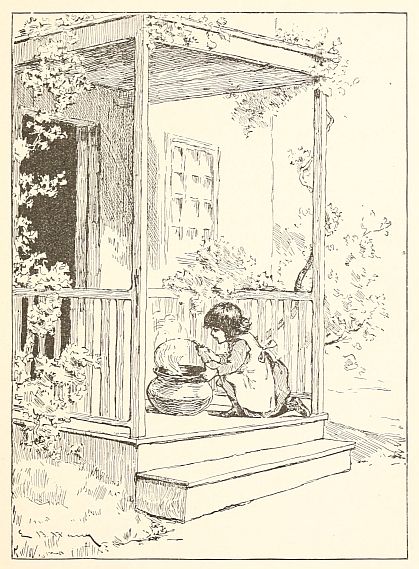
[38]
[39]Well, the hour did pass, somehow or other, though it was
a very long one; and at eleven o’clock, Jessy, with a mighty
effort, lifted the kettle from the stove and carried it to the open
door, that the fresh air might cool the boiling water. At first,
when she lifted the cover, such a cloud of steam came out that
she could see nothing; but in a moment the wind blew the
steam aside, and then she saw,—oh, poor little Jessy!—she
saw a mass of weeds floating about in a quantity of dirty, greenish
water, and that was all. Not the smallest trace of gold,
even in the buttercups themselves, was to be seen. Poor little
Jessy! she tried hard not to cry, but it was a bitter disappointment;
the tears came rolling down her cheeks faster and faster,
till at length she sat down by the kettle, and, burying her face
in her apron, sobbed as if her heart would break.
Presently, through her sobs, she heard a kind voice saying, “What is the matter, little one? Why do you cry so bitterly?” She looked up and saw an old gentleman with white hair and a bright, cheery face, standing by her. At first, Jessy could say nothing but “Oh! the cupperty-buts! oh! the cupperty-buts!” but, of course, the old gentleman didn’t know what she meant by that, so, as he urged her to tell him about her trouble, she dried her eyes, and told him the melancholy little story: how her mother was very poor, and said she wished she had some gold; and how she herself had tried to get the gold out of the buttercups by boiling them. “I was so sure I could get it out,” she said, “and I thought Mamma would be so pleased! And now—”
Here she was very near breaking down again; but the gentleman patted her head and said, cheerfully, “Wait a bit, little woman! Don’t give up the ship yet. You know that gold is heavy, very heavy indeed, and if there were any it would be at the very bottom of the kettle, all covered with the weeds, so[40] that you could not see it. I should not be at all surprised if you found some, after all. Run into the house and bring me a spoon with a long handle, and we will fish in the kettle, and see what we can find.”
Jessy’s face brightened, and she ran into the house. If any one had been standing near just at that moment, I think it is possible that he might have seen the old gentleman’s hand go into his pocket and out again very quickly, and might have heard a little splash in the kettle; but nobody was near, so, of course, I cannot say anything about it. At any rate, when Jessy came out with the spoon, he was standing with both hands in his pockets, looking in the opposite direction. He took the great iron spoon and fished about in the kettle for some time. At last there was a little clinking noise, and the old gentleman lifted the spoon. Oh, wonder and delight! In it lay three great, broad, shining pieces of gold! Jessy could hardly believe her eyes. She stared and stared; and when the old gentleman put the gold into her hand, she still stood as if in a happy dream, gazing at it. Suddenly she started, and remembered that she had not thanked her kindly helper. She looked up, and began, “Thank you, sir;” but the old gentleman was gone.
Well, the next question was, How could Jessy possibly wait till twelve o’clock for her mother to come home? Knitting was out of the question. She could do nothing but dance and look out of window, and look out of window and dance, holding the precious coins tight in her hand. At last, a well-known footstep was heard outside the door, and Mrs. Gray came in, looking very tired and worn. She smiled, however, when she saw Jessy, and said,—
“Well, my darling, I am glad to see you looking so bright. How has the morning gone with my little housekeeper?”[41]
“Oh, mother!” cried Jessy, hopping about on one foot, “it has gone very well! oh, very, very, very well! Oh, my mother dear, what do you think I have got in my hand? What do you think? oh, what do you think?” and she went dancing round and round, till poor Mrs. Gray was quite dizzy with watching her. At last she stopped, and holding out her hand, opened it and showed her mother what was in it. Mrs. Gray was really frightened.
“Jessy, my child!” she cried, “where did you get all that money?”
“Out of the cupperty-buts, Mamma!” said Jessy, “out of the cupperty-buts! and it’s all for you, every bit of it! Dear Mamma, now you will be happy, will you not?”
“Jessy,” said Mrs. Gray, “have you lost your senses, or are you playing some trick on me? Tell me all about this at once, dear child, and don’t talk nonsense.”
“But it isn’t nonsense, Mamma!” cried Jessy, “and it did come out of the cupperty-buts!”
And then she told her mother the whole story. The tears came into Mrs. Gray’s eyes, but they were tears of joy and gratitude.
“Jessy dear,” she said, “when we say our prayers at night, let us never forget to pray for that good gentleman. May Heaven bless him and reward him! for if it had not been for him, Jessy dear, I fear you would never have found the ‘Buttercup Gold.’”
Betty has a real stove, just as real as the one in the kitchen, if it is not quite so big. It has pots and kettles and a frying-pan, and a soup-pot, and the oven bakes beautifully, and it is just lovely! I went to spend the afternoon with her yesterday, and we cooked all the time, except when we were eating. First, we made soup in the soup-pot, with some pieces of cold goose, and we took some to Auntie (she is Betty’s mother), and she said it was de-licious, and took two cups of it. (They were doll’s cups; Betty says I ought to put that in, but I don’t see any need.) Then we made scrambled egg and porridge, and baked some custard in the oven, and it was just exactly like a big custard in the big cups at home. The cake was queer, so I won’t stop to tell about that, though Rover ate most of it, and the rest we crumbled up for the pigeons, so it wasn’t wasted; but the best of all was the griddle-cakes. Oh, they were splendid! The griddle is just the right size for one, so they were as round as pennies, and about the same size; and we had maple syrup on them, and Maggie the cook said she was so jealous (she called it “jellies”) that she should go[44] straight back to Ireland; but I don’t believe she will. I don’t feel very well to-day, and Betty wasn’t at school, either. But I don’t think it had anything to do with the griddle-cakes, and I am going to play with Betty again to-morrow,—if Mamma will let me.
“Wake up!” said an old gentleman, dressed in brown and white, as he gently shook the shoulder of a young lady in green, who was lying sound asleep under the trees. “Wake up, ma’am! it is your watch now, and time for me to take myself off.”
The young lady stirred a very little, and opened one of her eyes the least little bit. “Who are you?” she said, drowsily. “What is your name?”
“My name is Winter,” replied the old man. “What is yours?”
“I have not the faintest idea,” said the lady, closing her eyes again.
“Humph!” growled the old man, “a pretty person you are to take my place! Well, good-day, Madam Sleepyhead, and good luck to you!”
And off he stumped over the dead leaves, which crackled and rustled beneath his feet.[47]
As soon as he was gone, the young lady in green opened her eyes in good earnest and looked about her.
“Madam Sleepyhead, indeed!” she re-echoed, indignantly. “I am sure that is not my name, anyhow. The question is, What is it?”
She looked about her again, but nothing was to be seen save the bare branches of the trees, and the dead, brown leaves and dry moss underfoot.
“Trees, do you happen to know what my name is?” she asked.
The trees shook their heads. “No, ma’am,” they said, “we do not know; but perhaps when the Wind comes, he will be able to give you some information.”
The girl shivered a little, and drew her green mantle about her and waited.
By and by the Wind came blustering along. He caught the trees by their branches, and shook them in rough, though friendly greeting.
“Well, boys!” he shouted, “Old Winter is gone, is he? I wish you joy of his departure! But where is the lady who was coming to take his place?”
“She is here,” answered the trees, “sitting on the ground; but she does not know her own name, which seems to trouble her.”
“Ho! ho!” roared the Wind. “Not know her own name? That is news, indeed! And here she has been sleeping, while all the world has been looking for her, and calling her, and wondering where upon earth she was. Come, young lady,” he added, addressing the girl with rough courtesy, “I will show you the way to your dressing-room, which has been ready and waiting for you for a fortnight and more.”
So he led the way through the forest, and the girl followed,[48] rubbing her pretty, sleepy eyes, and dragging her mantle behind her.
Now it was a very singular thing that whatever the green mantle touched, instantly turned green itself. The brown moss put out little tufts of emerald velvet, fresh shoots came pushing up from the dead, dry grass, and even the shrubs and twigs against which the edges of the garment brushed broke out with tiny swelling buds, all ready to open into leaves.
By and by the Wind paused and pushed aside the branches, which made a close screen before him.
“Here is your dressing-room, young madam,” he said, with a low bow; “be pleased to enter it, and you will find all things in readiness. But let me entreat you to make your toilet speedily, for all the world is waiting for you.”
Greatly wondering, the young girl passed through the screen of branches, and found herself in a most marvellous place.
The ground was carpeted with pine-needles, soft and thick and brown. The pine-trees made a dense green wall around, and as the wind passed softly through the boughs, the air was sweet with their spicy fragrance. On the ground were piled great heaps of buds, all ready to blossom; violets, anemones, hepaticas, blood-root, while from under a huge pile of brown leaves peeped the pale pink buds of the Mayflower.
The young girl in the green mantle looked wonderingly at all these things. “How strange!” she said. “They are all asleep, and waiting for some one to waken them. Perhaps if I do it, they will tell me in return what my name is.”
She shook the buds lightly, and lo! every blossom opened its eyes and raised its head, and said, “Welcome, gracious lady! welcome! We have looked for you long, long!”
The young girl, in delight, took the lovely blossoms, rosy and purple, golden and white, and twined them in her fair locks,[49] and hung them in garlands round her white neck; and still they were opening by thousands, till the pine-tree hollow was filled with them.
Presently the girl spied a beautiful carved casket, which had been hidden under a pile of spicy leaves, and from inside of it came a rustling sound, the softest sound that was ever heard.
She lifted the lid, and out flew a cloud of butterflies.
Rainbow-tinted, softly, glitteringly, gayly fluttering, out they flew by thousands and thousands, and hovered about the maiden’s head; and the soft sound of their wings, which mortal ears are too dull to hear, seemed to say, “Welcome! welcome!”
At the same moment a great flock of beautiful birds came, flying, and lighted on the branches all around, and they, too, sang, “Welcome! welcome!”
The maiden clasped her hands and cried, “Why are you all so glad to see me? I feel—I know—that you are all mine, and I am yours; but how is it? Who am I? What is my name?”
And birds and flowers and rainbow-hued butterflies and sombre pine-trees all answered in joyous chorus, “Spring! the beautiful, the long-expected! Hail to the maiden Spring!”
When the spotted cat first found the nest, there was nothing in it, for it was only just finished. So she said, “I will wait!” for she was a patient cat, and the summer was before her. She waited a week, and then she climbed up again to the top of the tree, and peeped into the nest. There lay two lovely blue eggs, smooth and shining.
The spotted cat said, “Eggs may be good, but young birds are better. I will wait.” So she waited; and while she was waiting, she caught mice and rats, and washed herself and slept, and did all that a spotted cat should do to pass the time away.
When another week had passed, she climbed the tree again and peeped into the nest. This time there were five eggs. But the spotted cat said again, “Eggs may be good, but young birds are better. I will wait a little longer!”
So she waited a little longer and then went up again to look. Ah! there were five tiny birds, with big eyes and long necks, and yellow beaks wide open. Then the spotted cat sat down on the branch, and licked her nose and purred, for she was very happy. “It is worth while to be patient!” she said.
But when she looked again at the young birds, to see which one she should take first, she saw that they were very thin,—oh, very, very thin they were! The spotted cat had never seen anything so thin in her life.
“Now,” she said to herself, “if I were to wait only a few days longer, they would grow fat. Thin birds may be good, but fat birds are much better. I will wait!”[53]
So she waited; and she watched the father-bird bringing worms all day long to the nest, and said, “Aha! they must be fattening fast! they will soon be as fat as I wish them to be. Aha! what a good thing it is to be patient.”
At last, one day she thought, “Surely, now they must be fat enough! I will not wait another day. Aha! how good they will be!”
So she climbed up the tree, licking her chops all the way and thinking of the fat young birds. And when she reached the top and looked into the nest, it was empty!!
Then the spotted cat sat down on the branch and spoke thus, “Well, of all the horrid, mean, ungrateful creatures I ever saw, those birds are the horridest, and the meanest, and the most ungrateful! Mi-a-u-ow!!!!”
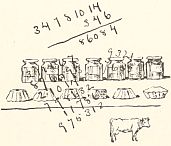

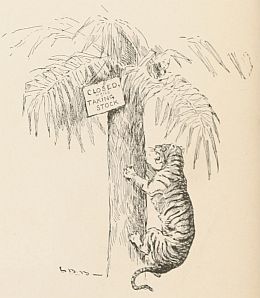
There was only one chapter more to finish the book. Bell did want very much indeed to finish it, and to make sure that the princess got out of the enchanted wood all right, and that the golden prince met her, riding on a jet-black charger and leading a snow-white palfrey with a silver saddle for her, as the fairy had promised he would.
She did want to finish it, and it seemed very hard that she should be interrupted every minute.
First it was dear Mamma calling for a glass of water from her sofa in the next room, and of course Bell sprang with alacrity to answer that call.
But then baby came, with a scratched finger to be tied up, and then Willy boy wanted some more tail for his kite, and[56] he could not find any paper, and his string had got all tangled up.
Then came little Carrie, and she had no buttons small enough for her dolly’s frock, and did sister think she had any in her work-basket?
So sister looked, and Carrie looked, too, and between them they upset the basket, and the spools rolled over the floor and under the chairs, as if they were playing a game; and the gray kitten caught her best spool of gold-colored floss, and had a delightful time with it, and got it all mixed up with her claws so that she couldn’t help herself, and Bell had to cut off yards and yards of the silk.
At last it was settled, and the little girl supplied with buttons, and Bell sank back again on the window-seat, so glad that she hadn’t been impatient, and had seen how funny the kitten looked, so that she could laugh instead of scold about the silk.
“And when the golden prince saw the Princess Merveille, he took her hand and kissed it, for it was like the purest ivory and delicately shaped. And he said—”
Tinkle! tinkle! went the door-bell, and Bell, with a long sigh, laid down the book and went to the door, for Mary was out. It was old Mr. Grimshaw.
“Good-day, miss!” he said, with old-fashioned courtesy, “I have come to borrow the third volume of ‘Paley’s Evidences.’ I met your worthy father, and he was good enough to say that you would find the book for me. I am of the opinion that he mentioned the right-hand corner of the third shelf in some bookcase; I do not rightly remember in which room.”
Bell showed the old gentleman into the study and brought him a chair, and looked in the right-hand corners of all the shelves; then she looked in the left-hand corners; then she[57] looked in the middle; then she looked on Papa’s desk, and in it and under it.
Then she looked on the mantel-piece, and in the cupboard, and in the chairs, for there was no knowing where dear Papa would put a book down when his thinking-cap was on. All the time Mr. Grimshaw was delivering a lecture on Paley, and telling her on what points he disagreed with him, and why; and Bell felt as if a teetotum were going round and round inside her head.
At last, in lifting Papa’s dressing-gown, which hung on the back of a chair, she felt something square and heavy in one of the pockets; and—there was the third volume of “Paley’s Evidences.”
She handed it to Mr. Grimshaw with her prettiest smile, and he went away thinking she was a very nice, well-mannered little girl.
And so she was; but—oh dear! when she got back to the window-seat the daylight was nearly gone.
Still, the west was very bright, and perhaps she could just find out.
“And he said, ‘Princess, my heart is yours! Therefore, I pray you, accept my hand, also, and with it my kingdom of Grendalma, which stretches from sea to sea. Ivory palaces shall be yours, and thrones of gold; mantles of peacock feathers, with many chests of precious stones.’ So the princess—”
“Bell!” called Mamma from the next room. “It is too late to read, dear! Blindman’s Holiday, you know, is the most dangerous time for the eyes. So shut the book, like a dear daughter!”
Bell shut the book, of course; but a cloud came over her pleasant face, and two little cross sticks began beating a tattoo on her heart.[58]
Just at that moment came voices under the window,—Carrie and Willy boy, talking earnestly. “Would a princess be very pretty, do you suppose, Willy? prettier than Bell?”
“Ho!” said Willy, “who cares for ‘pretty?’ She wouldn’t be half so nice as Bell. Why, none of the other fellows’ sisters—”
They passed out of hearing; and even so the cloud passed away from Bell’s brow, and she jumped up and shook her head at herself, and ran to give Mamma a kiss, and ask if she would like her tea.
The mother robin woke up in the early morning and roused her three children.
“Breakfast time, my dears!” she said; “and a good time for a flying lesson, besides. You did well enough yesterday, but to-day you must do better. You must fly down to the ground, and then I will show you how to get worms for yourselves. You will soon be too old to be fed, and I cannot have you more backward than the other broods.”
The young robins were rather frightened, for they had only had two short flying lessons, taking little flapping flutters among the branches. The ground seemed a long, long way off!
However, two of them scrambled on to the edge of the nest, and after balancing themselves for a moment, launched bravely out, and were soon standing beside their mother on the lawn, trembling, but very proud.
The third robin was lazy, and did not want to fly. He thought that if he stayed behind and said he was sick, his[61] mother would bring some worms up to him, as she had always done before. So he sat still in the nest, and drooped his head.
“Come along!” cried the mother robin. “Come, Pecky! Why are you sitting there alone?”
“I—don’t feel very well,” said Pecky. “I don’t feel strong enough to fly.”
“Oh!” said his mother, “then you had better not eat any breakfast, and I will send for Doctor Woodpecker.”
“Oh no, please don’t!” cried Pecky, and down he fluttered to the lawn.
“That’s right!” said the mother robin, approvingly. “I thought there was not much the matter with you. Now bustle about, my dear! See how well your brother and sister are doing! I declare, Toppy has got hold of a worm as long as himself. It will get away from him—no, it won’t! There! he has it now! Ah! that was a good mouthful, Toppy. You will be a fine eater!”
Pecky sat still, with his head on one side. He felt quite sure that if he waited and did nothing, his mother would take compassion on him and bring him some worms. There were Toppy and Flappy, working themselves to death in the hot sun. He had always been his mother’s favourite (so he thought, but it was not really so), and he was quite sure that she would not let him go hungry.
So he gave a little squeak, as if quite tired out, and put his head still more on one side, and shut his eyes, and sat still. Now his mother did not see him at all, for her back was turned, and she was eating a fine caterpillar, having no idea of waiting on lazy birds who were old enough to feed themselves.
But some one else did see Master Pecky! Richard Whittington, the great gray cat, had come out to get his breakfast, too,[62] and he saw the lazy robin sitting still in the middle of the lawn with his eyes shut.
Richard could not have caught one of the others, for they all had their wits about them, and their sharp black eyes glanced here and there, and they were ready to take flight at a moment’s notice.
But Richard Whittington crept nearer and nearer to the lazy robin. Suddenly—pounce! he went. There was a shrill, horrified squeak, and that was the last of poor Pecky Robin.
The mother robin and her two other children flew up into the tree and grieved bitterly for their lost Pecky, and the mother did not taste a single worm for several hours.
But Richard Whittington enjoyed his breakfast exceedingly; and he was as good-natured as possible all day, and did not scratch the baby once.
The Boy was going out to Roxbury. He was going alone, though he was only five years old. His Aunt Mary had put him in the horse car, and the car went directly past his house; and the Boy “hoped he did know enough to ask somebody big to ask the conductor to stop the car.”
So there the Boy was, all alone and very proud, with his legs sticking straight out, because they were not long enough to hang over,—but he did not mind that, because it showed his trousers all the better,—and his five cents clutched tight in his little warm hand.
Proud as he was, the Boy had a slight feeling of uneasiness somewhere down in the bottom of his heart. His Aunt Mary[63] had just been reading “Jack and the Bean-stalk” to him, and he was not quite sure that the man opposite him was not an ogre. He was a very, very large man, about twelve feet tall, the boy thought, and at least nine feet round. He had a wide mouth, full of sharp-looking teeth, and he rolled his eyes as he read the newspaper. He was not dressed like an ogre, and he carried no knife in sight; but it might be in one of the pockets of his big gray coat.
Altogether, the Boy did not like the looks of this man at all, but nobody else seemed to mind him. A pretty girl sat down close beside him,—a plump, tender-looking young girl,—but the big man took no notice of her or anybody else, and kept on reading his newspaper and rolling his eyes.
So the Boy sat still, only keeping a good lookout, so that if this formidable person should pull out a knife, or begin to grind his teeth and roar, “Fee! fi! fo! fum!” he could slip off the seat and out at the door before his huge enemy could get upon his feet.
The car began to fill up rapidly. Soon every seat was occupied, and several men were standing up. One of them trod, by accident, on the ogre’s toe,—the Boy could not help calling him the ogre, though he felt it might not be right,—and he gave a kind of growl, which made the Boy quiver and prepare to jump; but his eyes never moved from his newspaper, so the Boy sat still.
By and by a poor woman got in, with a heavy baby in her arms. She looked very tired, but though there were several other men sitting down beside the big gray one, no one moved to give the woman a seat.
The boy remembered his manners, and knew that he ought to get up; but then came the thought, “If I get up, I shall be close to the ogre, for there is no standing-room anywhere else.[64] I am wedged so close between these two ladies that I can hardly get out: and if I do, there cannot possibly be room for that large woman.”
The Boy gave heed to this thought, though he knew in his heart that it did not make any difference. Just then the tired woman gave a sigh and shifted the heavy baby to the other arm.
The Boy did not wait any longer, but slipped at once down from his seat. “Here is a little room, ma’am!” he said, in his clear, childish voice. “There isn’t enough for you, but you might put the baby down, and rest your arms.”
At that moment the car gave a lurch, and the Boy lost his balance and fell forward,—right against the knees of the ogre.
“Hi! hi!” said the big man, putting aside his newspaper, “what’s all this? Hey?”
The Boy could not speak for fright; but the poor woman answered, “It’s the dear little gentleman offering me his seat for the baby, sir! The Lord bless him for a little jewel that he is!”
“Hi! hi!” growled the big man, getting heavily up from his seat and still holding the boy’s arm, which he had grasped as the child fell, “this won’t do! One gentleman in the car, eh? And an old fellow reading his newspaper! Here, sit down here, my friend!” and he helped the woman to his seat, and bowed to her as if she were a duchess. “And as for you, Hop-o’-my-thumb—” Then he stooped and took the Boy up, and set him on his left arm, which was as big as a table. “There, sir!” he said, “sit you there and be comfortable, as you deserve.”
The Boy sat very still; indeed, he was too frightened to move. Since the man had called him Hop-o’-my-thumb, he was quite sure that he must be an ogre; perhaps the very ogre from whom Hop and his brothers escaped. The book said he died, but books do not always tell the truth; Papa said so.[65]
When the big man began to feel in the right-hand pockets of his gray coat, the child trembled so excessively that he shook the great arm on which he sat.
The man looked quickly at him. “What is the matter, my lad?” he asked; and his voice, though gruff, did not sound unkind. “You are not afraid of a big man, are you? Do you think I am an ogre?”
“Yes!” said the boy; and he gave one sob, and then stopped himself.
The gray man burst into a great roar of laughter, which made every one in the car jump in his seat.
Still laughing, he drew his hand from his pocket, and in it was—not a knife, but a beautiful, shining, golden pear. “Take that, young Hop-o’-my-thumb,” he said, putting it in the Boy’s hands. “If you will eat that, I promise not to eat you,—not even to take a single bite. Are you satisfied?”
The boy ventured to raise his eyes to the man’s face; and there he saw such a kind, funny, laughing look that before he knew it he was laughing, too.
“I don’t believe you are an ogre, after all!” he said.
“Don’t you?” said the big man. “Well, neither do I! But you may as well eat the pear, just the same.”
And the Boy did.
(Air: “Es Regnet.”)
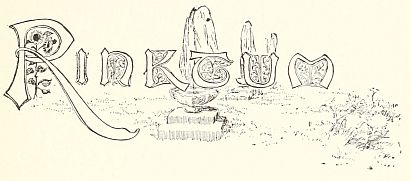
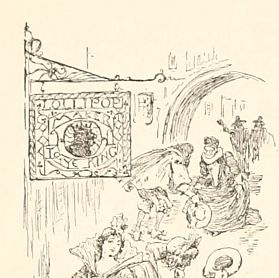
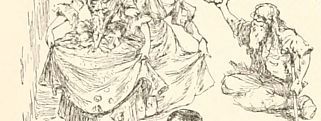




Will was digging a tunnel in the long drift. It was the longest drift that Will had ever seen, and he had meant to have Harry help him, but now they had quarrelled, and were never going to speak to each other as long as they lived, so Will had to begin alone.
He dug and dug, taking up great solid blocks of snow on his shovel, and tossing them over his shoulder in a workman-like manner. As he dug, he kept saying to himself that Harry was the hatefullest boy he ever saw in his life, and that he was glad he shouldn’t see anything more of him. It would seem queer, to be sure, not to play with him every day, for they had always played together ever since they put on short clothes; but Will didn’t care. He wasn’t going to be “put upon,” and Master Harry would find that out.
It was a very long drift. Will had never made such a fine tunnel; it did seem a pity that there should be no one to play with him in it, when it was done. But there was not a soul; for that Weaver boy was so rude, he did not want to have anything to do with him, and there was no one else of his age except Harry, and he should never see Harry again, at least not to speak to.
Dig! dig! dig! How pleasant it would be if somebody were digging from the other end, so that they could meet in the middle, and then play robbers in a cave, or miners, or travellers lost in the snow. That would be the best, because Spot could be the faithful hound, and drag them out by the hair, and have a bottle of milk round his neck for them to drink. Spot was[70] pretty small, but they could wriggle along themselves, and make believe he was dragging them. It would be fun! but he didn’t suppose he should have any fun now, since Harry had been so hateful, and they were never—no, never going to speak again, if it was ever so—
What was that noise? Could it be possible that he was getting to the end of the drift? It was as dark as ever,—the soft, white darkness of a snowdrift; but he certainly heard a noise close by, as if some one were digging very near him. What if—
Willy redoubled his efforts, and the noise grew louder and louder; presently a dog barked, and Will started, for he knew the sound of the bark. Just then the shovel sank into the snow and through it, and in the opening appeared Harry’s head, and the end of Spot’s nose. “Hullo, Will!” said Harry.
“Hullo, Harry!” said Will.
“Let’s play travellers in the snow!” said Harry. “This is just the middle of the drift, and we can be jolly and lost.”
“All right!” said Will, “let’s!”
They had a glorious play, and took turns in being the traveller and the pious monk of Saint Bernard; and they both felt so warm inside, they had no idea that the thermometer was at zero outside.
[A] This last line is not true, little girls; but it is hard, you know, to find good reasons for practising.
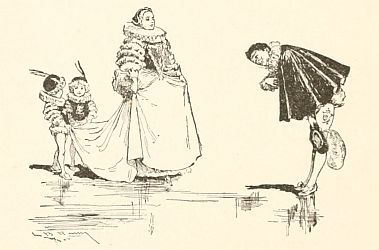
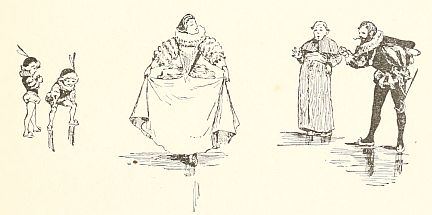
It was at Stirling Castle. People who did not know might have called it the shed, but that would show their ignorance. On the ramparts was mustered a gallant band, the flower of Scotland, armed with mangonels, catapults, and bows and arrows; below were the English, with their battering-rams and culverins and things. Ned was the English general, and led the storming party, and I was his staff, and Billy was the drummer, and drummed for the king. The Scottish general was Tom, and he had on Susie’s plaid skirt for a kilt, and his sporran was the rocking-horse’s tail that had come off.
Well, there was lots of snow on the roof,—I mean the ramparts, and they hurled it down on our heads, and we played ours was Greek fire, and hit them back like fun, I tell you. There was quite a mountain down below, where Andrew, the chore-man, had shovelled off the deep snow; and we stood on this, and it was up to my waist, and I played it was gore, because in Scott they are always wading knee-deep in gore, and I thought I would get ahead of them and go in up to my waist.
I hit General Montrose (that was Tom) with a splendid ball of Greek fire, and it was quite soft, and a lot of it got down his neck, and you ought to have seen him dance. He called me a dastardly Sassenach, and I thought at first he said “sausage,” and was as mad as hops, but afterward I didn’t care.
Then Ned called for volunteers to storm the castle, and we all ran to the ladder; but Ned climbed up the spout, ’cause he can shin like sixty, and he got up before we did. He took the warder by the throat, just like the Bold Buccleugh in “Kinmont[75] Willie,” and chucked him right off the roo—ramparts into the gore. That made Montrose mad as a hornet, and he rushed on Ned, and they got each other round the waist, and went all over the roof, till at last they got too near the edge, and over they both went. Billy was scared at that and stopped drumming, but I drew my mangonel (Susie says that isn’t the right name, but I don’t believe she knows) and rushed on the Scottish troops, which were only Jimmy Weaver, now that Montrose and the warder were gone. I got Jimmy down, and put my knee on his chest and shouted, “Victory! the day is ours! Saint George for England!”
But then I heard somebody else yelling, and I looked over the ramparts, and there was Montrose with his knee on Ned’s chest, waving his culverin and shouting, “Victory! the day is ours! Saint Andrew for Scotland!”
I was perfectly sure that our side had beaten, and Tom was absolutely certain that he had won a great victory; but just then mother called us in to tea, so we could not fight it over again to decide. Anyhow, Montrose got so much Greek fire down his neck that he had to change everything he had on, and I didn’t have to change a thing except my stockings.
It was a very hot day, and the little boy was lying on his stomach under the big linden tree, reading the “Scottish Chiefs.”
“Little Boy,” said his mother, “will you please go out in the garden and bring me a head of lettuce?”
“Oh, I—can’t!” said the little boy. “I’m—too—hot!”[76]
The little boy’s father happened to be close by, weeding the geranium bed; and when he heard this, he lifted the little boy gently by his waistband, and dipped him in the great tub of water that stood ready for watering the plants.
“There, my son!” said the father. “Now you are cool enough to go and get the lettuce; but remember next time that it will be easier to go at once when you are told as then you will not have to change your clothes.”
The little boy went drip, drip, dripping out into the garden and brought the lettuce; then he went drip, drip, dripping into the house and changed his clothes; but he said never a word, for he knew there was nothing to say.
That is the way they do things where the little boy lives. Would you like to live there? Perhaps not; yet he is a happy little boy, and he is learning the truth of the old saying,—
(A disquisition on the use of gunpowder, by Master Jack.)
“Where are you going, Miss Sophia?” asked Letty, looking over the gate.
“I am going to walk,” answered Miss Sophia. “Would you like to come with me, Letty?”
“Oh yes!” cried Letty, “I should like to go very much indeed! Only wait, please, while I get my bonnet!”
And Letty danced into the house, and danced out again with her brown poke bonnet over her sunny hair.
“Here I am, Miss Sophia!” she cried. “Now, where shall we go?”
“Down the lane!” said Miss Sophia, “and through the orchard into the fields. Perhaps we may find some strawberries.”
So away they went, the young lady walking demurely along, while the little girl frolicked and skipped about, now in front, now behind. It was pretty in the green lane. The ferns were soft and plumy, and the moss firm and springy under their feet. The trees bent down and talked to the ferns, and told them stories about the birds that were building in their branches; and the ferns had stories, too, about the black velvet mole who lived under their roots, and who had a star on the end of his nose.
But Letty and Miss Sophia did not hear all this; they only heard a soft whispering, and never thought what it meant.
Presently they came out of the lane, and passed through the orchard, and then came out into the broad, sunny meadow.
“Now, Letty,” said Miss Sophia, “use your bright eyes, and[79] see if you can find any strawberries! I will sit under a tree and rest a little.”
Away danced Letty, and soon she was peeping and peering under every leaf and grass blade; but no gleam of scarlet, no pretty clusters of red and white could she see. Evidently it was not a strawberry meadow. She came back to the tree, and said,—
“There are no strawberries, at all, Miss Sophia, not even one. But I have found something else. Wouldn’t you like to see it? Something very pretty.”
“What is it, dear?” asked Miss Sophia. “A flower? I should like to see it, certainly.”
“No, it is not a flower,” said Letty; “it’s a cow.”
“What?” cried Miss Sophia, springing to her feet.
“A cow,” said Letty, “a pretty, spotted cow. She’s coming after me, I think.”
Miss Sophia looked in the direction which Letty pointed, and there, to be sure, was a cow, moving slowly toward them. She gave a shriek of terror; then, controlling herself, she threw her arms around Letty.
“Be calm, my child!” she said, “I will save you! Be calm!”
“Why, what is the matter, Miss Sophia?” cried Letty in alarm.
Miss Sophia’s face was very pale, and she trembled; but she seized Letty’s arm, and bade her walk as fast as she could.
“If we should run,” she said, in a quivering voice, “it would run after us, and then we could not possibly escape. Walk fast, my child! Don’t scream! Try to keep calm!”
“Why, Miss Sophia!” cried the astonished child, “you don’t think I’m afraid of that cow, do you? Why, it’s—”
“Hush! hush!” whispered Miss Sophia, dragging her along,[80] “you will only enrage the creature by speaking aloud. I will save you, dear, if I can! See! we are getting near the fence. Can’t you walk a little faster?”
“Moo-oo-ooo!” said the cow, which was now following them at a quicker pace.
“Oh! oh!” cried Miss Sophia. “I shall faint, I know I shall! Letty, don’t faint too, dear. Let one of us escape. Courage, child! Be calm! Oh! there is the fence. Run, now, run for your life!”
The next minute they were both over the fence. Letty stood panting, with eyes and wide mouth open; but Miss Sophia clasped her in her arms and burst into tears.
“Safe!” she sobbed. “My dear, dear child, we are safe!”
“Yes, I suppose we are safe,” said the bewildered Letty. “But what was the matter? It was Uncle George’s cow, and she was coming home to be milked!”
“Moo-oo-oo!” said Uncle George’s cow, looking over the fence.
“Children,” asked Miss Mary, the teacher, “do you know what day this is?”
“Yes, ma’am!” cried Bobby Wilkins, looking up with sparkling eyes.
“Does any one else know?” asked Miss Mary.
No one spoke. The boy John knew very well what day it was, but he was off in the clouds, thinking of William the Conqueror, and did not hear a word Miss Mary said. Billy Green knew, too, but he had been reproved for chewing gum in class,[81] and was in the sulks, and would not speak. Of course Joe did not know, for he never knew anything of that kind; and none of the girls were going to answer when the boys were reciting. So Bobby Wilkins was the only one who spoke.
“It is a day,” said Miss Mary, looking round rather severely, “which ought to waken joy in the heart of every American, young or old.”
Bobby felt his cheeks glow, and his heart swell. He thought Miss Mary was very kind.
“It is a day,” she went on, “to be celebrated with feelings of pride and delight.”
Bobby felt of the bright new half-dollar in his pocket, and thought of the splendid kite at home, and of the cake that mother was making when he came away. He had not wanted to come to school to-day, but now he was glad he had come. He had no idea that Miss Mary would feel this way about it. He looked round to see how the others took it, but they all looked blank, except the boy John, who was standing on the field of Hastings, and whose countenance was illumined with the joy of victory.
“It is a day,” said Miss Mary, with kindling eyes (for the children were really very trying to-day), “which will be remembered in America as long as freedom and patriotism shall endure.”
Bobby felt as if he were growing taller. He saw himself in the President’s chair, or mounted on a great horse, like the statues of Washington, holding out a truncheon.
“One hundred and eighteen years ago to-day,” cried Miss Mary—
“Oh! oh my, it ain’t!” cried Bobby Wilkins, springing up. “It’s only seven.”
“Bobby, what do you mean?” asked Miss Mary, looking at[82] him severely. “You are very rude to interrupt me. What do you mean by ‘seven?’”
“My birthday,” faltered Bobby. “I ain’t a hundred anything, I’m only seven.”
“Come here, dear!” said Miss Mary, holding out her hand very kindly. “Come here, my little boy. I wish you very many happy returns, Bobby dear! but—but I was speaking of the battle of Bunker Hill.”
Poor Bobby! Miss Mary shook her head at the children over his shoulder, as he sat in her lap, as a sign not to laugh, but I suppose they could not help it. They did laugh a good deal,—all except the boy John, who was watching Harold die, and feeling rather sober in consequence.
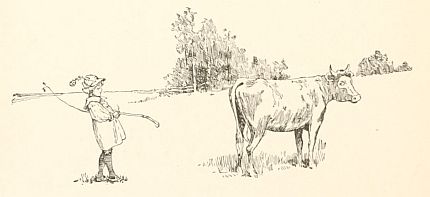
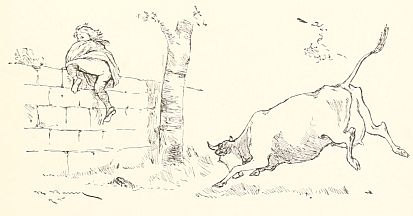
“Mamma,” said Mabel, “I am very glad we are rich!”
Mamma looked up with a little smile; she was patching Freddy’s trousers, and had just been wondering whether they would last till spring, and if not, how she was to get him another pair.
“Yes, Mabel dear,” she said. “We are very rich in some things. What were you thinking about when you spoke?”
“I was thinking how dreadful it would be to be hungry,” replied Mabel, thoughtfully. “I mean terribly hungry, like people in a shipwreck. Why, just to be a little hungry, the way Freddy and I get sometimes, makes me feel all queer inside; and besides, it makes me cross and horrid. So then I wondered how it would feel to be really hungry, and not to be sure that you were going to have good bread and milk for supper; and that made me feel so glad that we were rich.”
Mamma was silent for a few minutes. She was thinking of a house to which she took some work the day before. She had passed through the dining-room, and there, at the carved table, sat a little girl with her supper before her,—delicate rolls, and cold chicken, and raspberry jam, and hot cocoa in a china cup all covered with roses, and creamy milk in a great silver mug.
The child was about Mabel’s age, but her face wore a very different expression. She had pushed her chair back, and was crying out that she would not eat cold chicken. She wouldn’t, she wouldn’t, she wouldn’t! so there now! The nurse might just as well take it away, and she was a horrid cross old thing![85] Mamma was going to have partridge for dinner, and she wanted some of that, and she would have it.
Then, when the nurse shook her white-capped head and said, “No miss! your Mamma said you were to have the chicken; so now eat it, like a good girl, and you shall have some jam,” the child flew at her like a little fury, and slapped and pinched her. That was all that Mabel’s Mamma saw, but as she thought of it, and then looked at her little maiden, with a sweet face smiling over her blue pinafore, she smiled again, very tenderly, and said,—
“Yes, dear, it is a very good thing to be rich, if it is the right kind of riches. Go now, darling, and get the bread and milk; set the table, and then call Freddy in to supper.”
It was a lovely day in June, and the poor little girl was going out. She was so poor that she had to go in a great big carriage, with two fat, slow horses and a sleepy driver, who got very angry if you asked him to drive a little faster. She was dressed in a white frock, frilled and flounced, and she had a fashionable little hat on her head, which stuck up in front, so that the wind was always catching it and blowing it off. She had tight kid gloves on her little hands, and beautiful little bronze kid boots on her feet; so you see she was very poor indeed.
The carriage rolled slowly along through the park, and the little girl saw many other poor children, also sitting in carriages, with tight kid gloves and kid boots; she nodded to them,[86] and they to her, but it was not very interesting. By and by they left the park, and drove out into the country, where there were green fields, with no signs to keep people off the grass. The grass was full of buttercups, and in one field were two little girls, running about, with their hands full of the lovely golden blossoms, laughing and shouting to each other. One had a pink calico dress on, and the other a brown gingham, and they were barefooted, and their sunbonnets were lying on the grass. The poor little girl looked at them with sparkling eyes.
“Oh, Mademoiselle!” she cried, “may I get out and run about a little? See what a good time those children are having! Do let me jump out, please!”
“Fi donc, Claire!” said the lady who sat beside her. She was a thin, dark lady, with sharp, eager black eyes, and not a pleasant face. “Fi donc! What would madame, your mother, say, if she heard you desiring to run in the fields like the beggar children? Those children—dirty little wretches!—are barefooted, and it is evident that their hair has never known the brush. Do not look at them, child! Look at the prospect!”
“I don’t care about the prospect!” said the poor child. “I want some buttercups. We never have buttercups at our house, Mademoiselle. I wish I might pick just a few!”
“Assuredly not!” cried Mademoiselle, her eyes growing blacker and sharper. “Let you leave the carriage and run about in the mire, for the sake of a few common, vulgar flowers? Look at your dress, Claire! Look at your delicate shoes, and your new pearl-colored gloves! Are these the things to run in the dirt with? I will not be responsible for such conduct. Sit still, and when we reach home the gardener shall pick you some roses.”
“I don’t want roses!” said the poor little girl, sighing wearily. “I am tired of roses. I want buttercups!”[87]
She sighed again, and leaned back on the velvet cushions; the carriage rolled on. The barefoot children gazed after it with wondering eyes.
“My!” said one, “wasn’t she dressed fine, though!”
“Yes,” said the other; “but she looked as if she was having a horrid time, poor thing.”
“Poor thing!” echoed the first child.
“I mean to have the best time this Fourth of July that I ever had in my life,” said the Big Boy. Then all the other big boys clustered round him to hear what the good time was to be, and the little boy sighed and wished he were big, too. The big boys did not tell him what they were going to do, but I know all about it, so I can tell. They made a camp in the Big Boy’s room, which is out in the barn. One boy brought a comforter, and another brought a pair of blankets; and there was an old spring mattress up in the loft, so that with the Big Boy’s own bed, which could hold two (if you kept very still and didn’t kick the other fellow out), they did very well indeed. The Big Boy’s mother, knowing something of boys, had set out a lunch for them, crackers and cheese, and gingerbread and milk, so there was no danger of starvation.
Of course they were busy in the early part of the evening, buying their firecrackers and torpedoes, their fish-horns and all their noisy horrors (for you must understand that this was the night before the Glorious Fourth); but by nine o’clock they were all assembled in the barn, ready to have the very best time[88] in the world. First they ate some lunch, and that was good; then they thought they would take a nap, just for an hour or so, that they might not be sleepy when the time came. Two of them lay down on the Big Boy’s bed, and two on the old spring mattress, and two on the floor; but it did not make much difference where they began their nap, for when the boys’ mother took a peep at them about ten o’clock, she found them all lying in a heap on the floor, sound asleep, though the Thin Boy was groaning in his sleep because the Fat Boy was lying across his neck.
Suddenly the Big Boy awoke with a start, and looking at his watch, found that it was half past eleven. Hastily he roused the sleepers, and there was a hurrying and scurrying, a hunting for caps, a snatching up of horns and slow-match. Then softly they stole down the barn stairs, and away they went to the old church, and up they climbed into the belfry. The sexton had left the door unlocked, having been a boy himself once; so there they waited till twelve o’clock came. Ah! what a grand time they had then, “ringing the bells till they rocked the steeple;” but it only lasted an hour, and then there was all the rest of the night. They went here and they went there, and when they grew hungry they went back to the barn and finished the lunch; and then they tried to go to sleep again, but they kept falling about so, it was no use, so they waited till they thought their own houses would be open, and then they went home, and the Big Boy crept into his bed and slept till noon.
But the Little Boy woke up at six o’clock, and jumped up like a lark, and got his torpedoes and firecrackers, and was very cheerful, though he did sigh just once when he thought of the big boys. He turned the gravel-sweep into a battle-field, and made forts and mines for the firecrackers, and then he cracked and snapped and fizzed and blazed—at least the firecrackers[89] did—all the morning. He only burned his fingers twice and his trousers five times, and that was doing very well. He had a glorious day; and his mother thought—but neither the Little Boy nor the Big Boy agreed with her—that the best part of all was the good night’s sleep beforehand.
The young ladies had a reception this afternoon, and a charming occasion it was. The guests were invited for four o’clock, and when I came in at five the party was in full swing.
Clare was the hostess,—lovely Clare, with her innocent blue eyes and gentle, unchanging smile. The nursery was transformed into a bower of beauty, and Clare was standing by a chair, holding out her hand with a gracious gesture of welcome.[91] Alida received with her, and she looked charming, too, only she was so much smaller that she had to be stood up on a box to bring her to a level with Clare’s shoulder. Alida is a remarkable doll, because she can open and shut her eyes without lying down or getting up; and Betty sat on the floor behind her and pulled the strings, so that she waved her long eyelashes up and down in the most enchanting manner.
All the dolls were in their best clothes, except Jack the sailor, who cannot change his suit, because it is against his principles; and I must say they made a pretty party. The tea-things were set out on the little round table, all the best cups and saucers, and the pewter teapot that came from Holland, and the gold spoons; and there was real cocoa, and jam, and oyster crackers, and thin bread and butter.
Rosalie Urania presided at the tea-table, and poured the cocoa with such grace that no one would have suspected her of being helped a little by Juliet (Juliet is not a doll), who was hidden behind the table.
“Will you have a cup of cocoa?” asked Rosalie, sweetly, as Mr. Punchinello approached her with his most elegant bow.
“With pleasure, lovely maiden!” was the courtly reply. “From your hands what would not your devoted Punchinello take?”
He bowed and smiled again (indeed, he was always smiling), while Rosalie, blushing (it was a way she had), lifted the pewter teapot, and deftly filled one of the pretty cups.
“He’ll take a licking from my hands if he doesn’t look out!” growled Jack, the sailor, who is jealous of Punchinello, and loves Rosalie Urania.
“Hush, you rude creature!” whispered Alida, giving Jack a little push. Clare is quite sure that Alida only meant the push as a gentle rebuke to Jack, and a warning to keep quiet, and[92] not let his angry passions rise; but Clare always stands up for Alida. However it was, Jack tottered, staggered forward, and fell against Mr. Punchinello, knocking that smiling gentleman over on the table, and upsetting the teapot all over Rosalie Urania’s pink silk gown. Such a confusion as arose then! Rosalie fainted, of course. Jack picked himself up, and looked black as thunder. Alida shut her eyes, and kept them shut (she said it was from horror, but it may have been because Betty forgot to pull the opening string), but Clare and Mr. Punchinello did nothing but smile, which was a proof of their exquisite breeding.
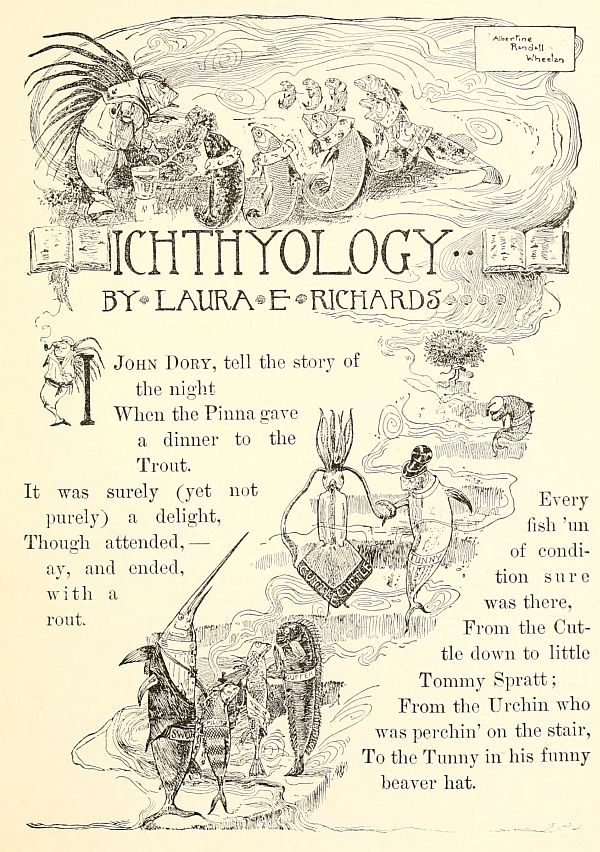

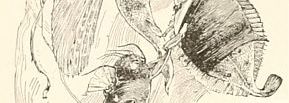
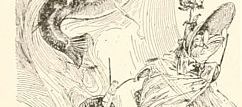


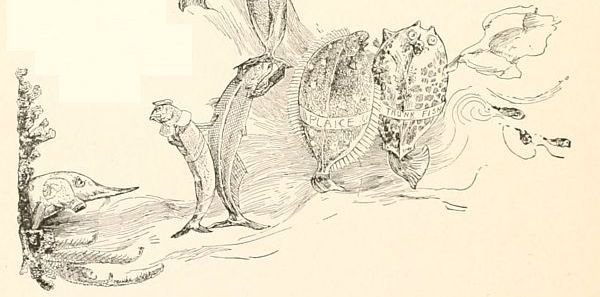

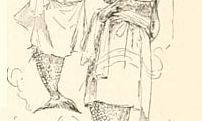
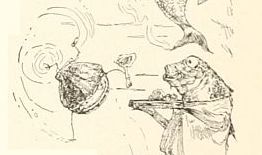
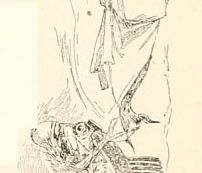
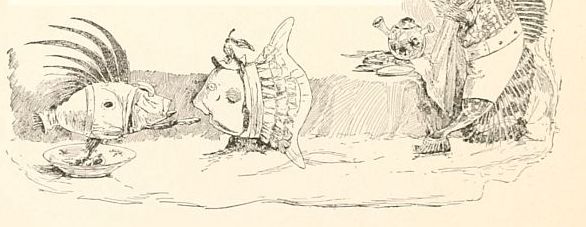
We drove them, and we clove them to the gill,
We raced them and we chased them through the sea;
And the Scallop gave a wallop when we took away his collop,
But the Sculpin still was gulpin’ of his tea,—deary me!
How that Sculpin was a-gulpin’ of his tea!
|
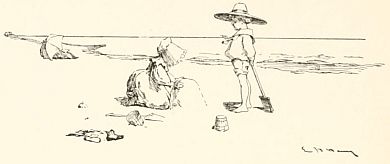
This is the receipt for a happy morning:
Mix the shovels with the sandy beach, and season well with starfish. Add the sunbonnets to the children, and, when thoroughly united, add the wooden pails. Spread the sun and the sea on the beach, and sprinkle thoroughly with sea-urchins and clam-shells. Add the children, mix thoroughly, and bake as long as advisable.
N. B. Do not add the mother at all, except in case of necessity.
“Mother,” said Roger, swinging in at the door and catching up the baby for a toss, “I am going to begin Physical Geography! And teacher says I must have a book, please, as soon as I can get it. It costs two dollars, and it’s just full of pictures, oh, so interesting! And may I get it to-day, please, mother?”
“Mother” looked up with a sad little loving smile. “Dear heart,” she said, “I have not two dollars in the world just now, unless I take them from the money I am saving for your new suit, and I hardly ought to do that, my poor Roger!”
Roger looked down with a rueful whistle at his clothes, which, though clean, were patched and darned to the utmost limit.
“I’m afraid the Patent Mosaic Suit is rather past the bloom of youth,” he said, cheerily. “Never mind, mammy! Perhaps Will Almy will lend me his book, sometimes, or I can study in recess out of Miss Black’s. Don’t worry, anyhow, but catch Miss Dumpling here, while I go and bring in some water.”
Mrs. Rayne sighed deeply, as Roger set the baby on her lap and darted out of the house. She knew it was to hide his face of disappointment that the boy had gone off so hurriedly.
Poor Roger! so bright, so eager to learn, he ought to have a first-rate education! But how could she, a widow with four children on a tiny farm, give it to him? Bread and butter and decent clothing must come first, and these were hard enough to win, even though she worked all day and half the night for them. Education must be picked up as it could.
The little woman shook her head and sighed again, as she put[100] Miss Dumpling on the floor with a button-string to play with, and took up the pile of mending.
But Roger, though he was disappointed, had no idea of giving up the Physical Geography. Not a bit of it!
“Mother cannot get it for me,” he said, as he turned away at the windlass of the old well. “Very well, then, I must get it myself. The only question is, how?”
Up came the brimming bucket, and, as he stooped to lift it, he saw in the clear water the reflection of a bright, anxious face, with inquiring eyes and a resolute mouth. “Don’t be afraid, old fellow!” he said, with a reassuring nod. “‘How?’ is a short question, and I am sure to find the answer before the day is out,” and, whistling merrily, he went off to water the garden.
That evening, just as the sun was sinking, all golden and glorious beneath the horizon, a boat pushed out from among the reeds that fringed Pleasant Pond. It was a rough little dory of no particular model, painted a dingy green, but its crew was apparently well satisfied with it. One boy sat in the stern and paddled sturdily: another crouched in the bow, scanning the reeds with a critical air, while between them sat a little fair-haired maiden, leaning over the side and singing, as she dipped her hands in the clear, dark water.
“Here’s a fine bunch of cat-tails!” cried Roger. “Shove her in here, Joe!”
Joe obeyed, and Roger’s knife was soon at work cutting the stately reeds, with their sceptre-tips of firm, brown velvet.
“Oh, and here are the lilies!” cried little Annet. “See, Roger! see! all white and gold, the lovely things! Oh, let me pull them!”
In another moment, the boat seemed to be resting on a living carpet of snow and gold. The lilies grew so thick that one could hardly see the water between them. Roger and Annet[101] drew them in by handfuls, laying them in glistening piles in the bottom of the boat, and soon Joe laid down his paddle, and joined in the picking.
“Some pooty, be n’t they?” he said. “What d’ye cal’late ter sell ’em for, Roger?”
“For whatever I can get,” replied Roger, cheerfully. “I’ve never tried it before, but I know that plenty of boys do take them to the city from other ponds and streams. We are a little farther off, but I never saw any lilies so large as ours.”
“Nor so sweet!” cried Annet, burying her rosy face in the golden heart of a snowy cup. “Oh, how I love them!”
How the lilies must have wondered at the adventures that befell them after this! All night they lay in a great tub of water, which was well enough, though there was no mud in it. Then, at daybreak next morning they were taken out and laid on a bed of wet moss and covered with wet burdock leaves. Then came a long period of jolting, when the world went bumping up and down with a noise of creaking and rumbling, broken by the sound of human voices.
Finally, and suddenly, they emerged into the full glare of the sun, and found themselves in a new world altogether,—a street corner in a great city; tall buildings, glittering windows, crowds of men and women hurrying to and fro like ants about an ant-hill. Only the cool, wet moss beneath them, and the sight of their old friends, the cat-tails, standing like sentinels beside them, kept the lilies from fainting away altogether.
Roger looked eagerly about him, scanning the faces of the passers-by. Would this one buy? or that one? that pretty lady, who looked like a lily herself? He held out a bunch timidly, and the lady smiled and stopped.
“How lovely and fresh! Thank you!” and the first piece of silver dropped into Roger’s pocket, and chinked merrily[102] against his jackknife. Then another young lady carried off a huge bunch of cat-tails, and a second piece of silver jingled against the first.
Soon another followed it, and another, and another, and Roger’s eyes danced, and his hopes rose higher and higher.
At this rate, the Physical Geography would be his, beyond a doubt. He saw it already,—the smooth green covers, the delightful maps within, the pictures of tropical countries, of monkeys and cocoanuts, elephants and—THUMP! His dream was rudely broken in upon by a gentleman running against him and nearly knocking him over,—an old gentleman, with fierce, twinkling eyes and a bushy gray beard.
“What! what!” sputtered the old gentleman, pettishly. “Get out of my way, boy! My fault! beg your pardon!” Roger moved aside, bewildered by the sudden shock.
“Will you buy some Physical Geographies, sir?” he asked. “See how fresh they are? They are the loveliest—”
“This boy is a lunatic!” said the old gentleman, fiercely, “and ought to be shut up. How dare you talk to me about Physical Geography, sir?”
Roger stared at him blankly, and then grew crimson with shame and confusion. “I—I beg your pardon, sir!” he faltered, “I meant to say ‘lilies.’ I was thinking so hard about the geography that it slipped out without my knowing it. I suppose. I—”
“What! what!” cried the old gentleman, catching him by his arm. “Thinking about Physical Geography, hey? What d’ye mean? This is a remarkable boy. Come here, sir! come here!”
He dragged Roger to one side, and made him sit down beside him on a convenient doorstep. “What d’ye mean?” he repeated, fixing his piercing gray eyes upon the boy in a manner which[103] made him feel very uncomfortable. “What do you know about Physical Geography?”
“Nothing yet, sir,” replied Roger, modestly. “But I am very anxious to study it, and I am selling these lilies and cat-tails to try and get money enough to buy the book.”
“This is a most remarkable boy!” cried the old gentleman. “What geography is it you want, hey? Merton’s, I’ll warrant. Trash, sir! unspeakable trash!”
“No, sir; Willison’s,” replied the boy, thinking that the old gentleman was certainly crazy.
But on hearing this, his strange companion seized him by the hand, and shook it warmly. “I am Willison!” he exclaimed. “It is my Geography! You are a singularly intelligent boy. I am glad to meet you.”
Roger stared in blank wonderment. “Did—did you write the Physical Geography, sir?” he stammered, finally.
“To be sure I did!” said the old gentleman, “and a good job it was! While that ass Merton,—here! here!” he cried, fumbling in his pockets, “give me the lilies, and take that!” and he thrust a shining silver dollar into Roger’s hand. “And here!” he scribbled something on a card, “take that, and go to Cooper, the publisher, and see what he says to you. You are an astonishing boy! Good-by! God bless you! You have done me good. I was suffering from dyspepsia when I met you,—atrocious tortures! All gone now! Bless you!”
He was gone, and Roger Rayne was sitting alone on the steps, with the dollar in one hand, and the card in the other, as bewildered a boy as any in Boston town.
When he recovered his senses a little, he looked at the card and read, in breezy, straggling letters, “Give to the astonishing boy who brings this, a copy of my Physical Geography. Best binding. William Willison.”
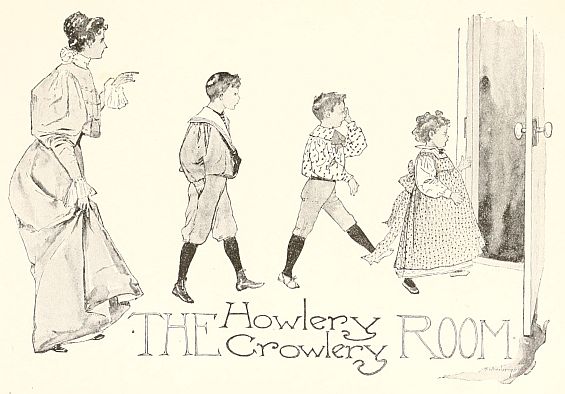
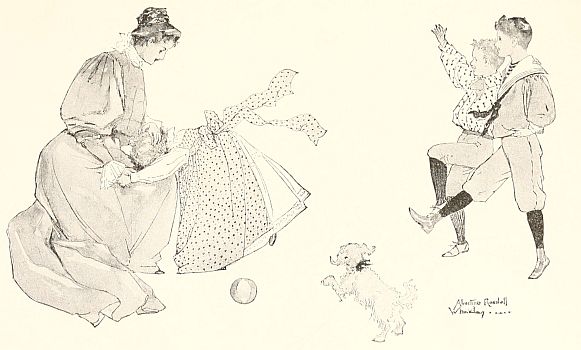
There was once a hen with brown speckled wings and a short black tail. She stood in a shop window, on a bit of wood covered with green baize, and kept watch over the eggs with which the window was filled.
“I may be stuffed,” said the hen, “but I hope I know my duty for all that!”
There were many eggs, and some of them were very different from the eggs to which she had been accustomed; but she did not see what she could do about that.
“Their mothers must be people of very vulgar tastes,” she said, “or else fashions have changed sadly. In my day a hen who laid red or blue or green eggs would have been chased out of the barnyard; but the world has gone steadily backward since then, I have reason to think.”
She was silent, and fixed her eyes on a large white egg which had been recently placed in the window.
There was something strange about that egg. She had never seen one like it. No hen that ever lived could lay such a monstrous thing; even a turkey could not produce one of half the size.
Whence could it have come? She remembered stories that she had heard, when a pullet, of huge birds as tall as the hen-house, called ostriches. Could this be an ostrich egg? If it was, she could not possibly be expected to take care of the chick.
“The idea!” she said. “Why, it will be as big as I am!”
At this moment a hand appeared in the window. It was the[114] shopkeeper’s hand, and it set down before the hen an object which filled her with amazement and consternation.
It looked like an egg: that is, it was shaped and coloured like an egg; but from the top, which was broken, protruded a head which certainly was not that of a chicken.
The head wore a black hat; it had a round, rosy face, something like the shopkeeper’s, and what could be seen of the shoulders was clad in a bottle-green coat, with a bright-red cravat tied under the pink chin.
The little black eyes met the hen’s troubled glance with a bright and cheerful look.
“Good-morning!” said the creature. “It’s a fine day!”
“What are you?” asked the hen, rather sternly. “I don’t approve of your appearance at all. Do you call yourself a chicken, pray?”
“Why, no,” said the thing, looking down at itself. “I—I am a man, I think. Eh? I have a hat, you see.”
“No, you are not!” cried the hen, in some excitement. “Men don’t come out of eggs. You ought to be a chicken, but there is some mistake somewhere. Can’t you get back into your shell, and—a—change your clothes, or do something?”
“I’m afraid not,” said the little man (for he was a man). “I don’t seem to be able to move much; and besides, I don’t think I was meant for a chicken. I don’t feel like a chicken.”
“Oh, but look at your shell!” cried the poor hen. “Consider the example you are setting to all these eggs! There’s no knowing what they will hatch into if they see this sort of thing going on. I will lend you some feathers,” she added, coaxingly, “and perhaps I can scratch round and find you a worm, though my legs are pretty stiff. Come, be a good chicken, and get back into your shell!”
“I don’t like worms,” said the little man, decidedly. “And[115] I am not a chicken, I tell you. Did you ever see a chicken with a hat on?”
“N—no,” replied the hen, doubtfully, “I don’t think I ever did.”
“Well, then!” said the little man, triumphantly.
And the hen was silent, for one cannot argue well when one is stuffed.
The little man now looked about him in a leisurely way, and presently his eyes fell on the great white egg.
“Is that your egg?” he asked, politely.
The hen appreciated the compliment, but replied, rather sadly, “No, it is not. I do not even know whose egg it is. I expect to watch over the eggs in a general way, and I hope I know my duty; but I really do not feel as if I could manage a chicken of that size. Besides,” she added, with a glance at the black hat and the bottle-green coat, “how do I know that it will be a chicken? It may hatch out a—a—sea-serpent, for aught I know.”
“Would you like to make sure?” asked the little man, who really had a kind heart, and would have been a chicken if he could. “There seems to be a crack where this ribbon is tied on. Shall I peep through and see what is inside?”
“I shall be truly grateful if you will!” cried the hen. “I assure you it weighs upon my mind.”
The little man leaned over against the great white egg, and took a long look through the crack.
“Compose yourself!” he said, at last, looking at the hen with an anxious expression. “I fear this will be a blow to you. There are five white rabbits inside this egg!”
The speckled hen rolled her glass eyes wildly about and tried to cackle, but in vain.
“This is too much!” she said. “This is more than I can[116] bear. Tell the shopkeeper that he must get some one else to mind his eggs, for a barnyard where the eggs hatch into rabbits is no place for me.”
And with one despairing cluck, the hen fell off the bit of wood and lay at full length on the shelf.
“It is a pity for people to be sensitive,” said the little man to himself, as he surveyed her lifeless body. “Why are not five rabbits as good as one chicken, I should like to know? After all, it is only a man who can understand these matters.”
And he cocked his black hat, and settled his red necktie, and thought very well of himself.
Jack Russell was five years old and ten days over; therefore, it is plain that he was now a big boy. He had left off kilts, and his trousers had as many buttons as it is possible for trousers to have, and his boots had a noble squeak in them. What would you have more?
This being the case, of course Jack could go down town with his Mamma when she went shopping, a thing that little boys cannot do, as a rule.
One day in Christmas week, when all the shops were full of pretty things, Jack and his Mamma found themselves in the gay street, with crowds of people hurrying to and fro, all carrying parcels of every imaginable shape.
The air was crisp and tingling, the sleigh-bells made a merry din, and everybody looked cheerful and smiling, as if they knew that Christmas was only five days off.[117]
Almost everybody, for as Jack stopped to look in at a shop window, he saw some one who did not look cheerful. It was a poor woman, thinly and miserably clad, and holding a little boy by the hand.
The boy was little, because he wore petticoats (oh, such poor, ragged petticoats)! but he was taller than Jack. He was looking longingly at the toys in the window.
“Oh, mother!” he cried, “see that little horse! Oh, I wish I had a little horse!”
“My dear,” said the poor woman, sighing, “if I can give you an apple to eat with your bread on Christmas Day, you must be thankful, for I can do no more. Poor people can’t have pretty things like those.”
“Come, Jack!” said Mrs. Russell, drawing him on hastily. “What are you stopping for, child?”
“Mamma,” asked Jack, trudging along stoutly, but looking grave and perplexed, “why can’t poor people have nice things?”
“Why? Oh!” said Mrs. Russell, who had not noticed the poor woman and her boy, “because they have no money to buy them. Pretty things cost money, you know.”
Jack thought this over a little in his own way; then, “But, Mamma,” he said, “why don’t they buy some money at the money shop?”
Mrs. Russell only laughed at this, and patted Jack’s head and called him a “little goose,” and then they went into a large shop and bought a beautiful wax doll for Sissy.
But Jack’s mind was still at work, and while they were waiting for the flaxen-haired beauty to be wrapped in white tissue paper and put in a box, he pursued his inquiries.
“Where do you get your money, Mamma dear?”
“Why, your dear Papa gives me my money, Jacky boy.[118] Didn’t you see him give me all those nice crisp bills this morning?”
“And where does my Papa get his money?”
“Oh, child, how you do ask questions! He gets it at the bank.”
“Then is the bank the money shop, Mamma?”
Mrs. Russell laughed absent-mindedly, for, in truth, her thoughts were on other things, and she was only half-listening to the child, which was a pity. “Yes, dear,” she said, “it is the only money shop I know of. Now you must not ask me any more questions, Jack. You distract me!”
But Jack had no more questions to ask.
The next day, as the cashier at the National Bank was busily adding up an endless column of figures, he was startled by hearing a voice which apparently came from nowhere.
No face appeared at the little window in the gilded grating, and yet a sweet, silvery voice was certainly saying, with great distinctness, “If you please, I should like to buy some money.”
He looked through the window and saw a small boy, carrying a bundle almost as big as himself.
“What can I do for you, my little man?” asked the cashier kindly.
“I should like to buy some money, please,” repeated Jack, very politely.
“Oh, indeed!” said the cashier, with a twinkle in his eye. “And how much money would you like, sir?”
“About a fousand dollars, I fink,” said Jack, promptly. (It does sometimes happen that big boys cannot pronounce “th” distinctly, but they are none the less big for that.)
“A thousand dollars!” repeated the cashier. “That’s a good deal of money, young gentleman!”[119]
“I know it,” said Jack. “I wants a good deal. I have brought some fings to pay for it,” he added, confidentially; and opening the big bundle with great pride, he displayed to the astonished official a hobby-horse, a drum (nearly new), a set of building blocks and a paint-box.
“It’s a very good hobby-horse,” he said, proudly. “It has real hair, and he will go just as fast as—as you can make him go.”
Here the cashier turned red in the face, coughed and disappeared. “Perhaps he is having a fit, like the yellow kitten,” said Jack to himself, calmly; and he waited with cheerful patience till he should get his money.
In a few moments the cashier returned, and taking him by the hand, led him kindly into a back room, where three gentlemen were sitting.
They all had gray hair, and two of them wore gold-bowed spectacles; but they looked kind, and one of them beckoned Jack to come to him.
“What is all this, my little lad?” he asked. “Did any one send you here to get money?”
Jack shook his head stoutly. “No,” he said, “I comed myself; but I am not little. I stopped being little when I had trousers.”
“I see!” said the gentleman. “Of course. But what made you think you could get money here?”
The blue eyes opened wide.
“Mamma said that Papa got his money here; and I asked her if this was a money shop, and she said it was the only money shop she knowed of. So I comed.”
“Just so,” said the kind gentleman, stroking the curly head before him. “And you brought these things to pay for the money?”[120]
“Yes,” said Jack, cheerfully. “’Cause you buy fings with money, you see, so I s’pose you buy money with fings.”
“And what did you mean to do with a thousand dollars?” asked the gentleman. “Buy candy, eh?”
Then Jack looked up into the gentle gray eyes and told his little story about the poor woman whom he had seen the day before. “She was so poor,” he said, “her little boy could not have any Christmas at all, only an apple and some bread, and I’m sure that isn’t Christmas. And she hadn’t any money, not any at all. So I fought I would buy her some, and then she could get everything she wanted.”
By this time the two other gentlemen had their hands in their pockets; but the first one motioned them to wait, and taking the little boy on his knee, he told him in a few simple words what a bank really was, and why one could not buy money there.
“But you see, dear,” he added, seeing the disappointment in the child’s face, “you have here in your hands the very things that poor woman would like to buy for her little boy. Give her the fine hobby-horse and the drum and the paint-box, too, if you like, and she can give him the finest Christmas that ever a poor boy had.”
Jack’s face lighted up again, and a smile flashed through the tears that stood in his sweet blue eyes. “I never fought of that!” he cried, joyfully.
“And,” continued the old gentleman, drawing a gold piece from his pocket and putting it in the little chubby hand, “you may give that to the poor woman to buy a turkey with.”
“And that,” cried the second old gentleman, putting another gold piece on top of it, “to buy mince-pies with.”
“And that,” cried the third old gentleman, while a third gold piece clinked on the other two, “to buy a plum-pudding with.”[121]
“And God bless you, my dear little boy!” said the first gentleman, “and may you always keep your loving heart, and never want a piece of money to make Christmas for the poor.”
Little Jack looked from one to the other with radiant eyes. “You are very good shopkeepers,” he said. “I love you all very much. I should like to kiss you all, please.”
And none of those three old gentlemen had ever had so sweet a kiss in his life.
“What shall I do all this long afternoon?” cried Will, yawning and stretching himself. “What—shall—I—do? A whole long afternoon, and the rain pouring and nothing to do. It will seem like a whole week till supper time. I know it will. Oh—dear—me!”
“It is too bad!” said Aunt Harriet, sympathetically. “Poor lad! What will you do, indeed? While you are waiting, suppose you just hold this yarn for me.”
Will held six skeins of yarn, one after another; and Aunt Harriet told him six stories, one after the other, each better than the last.
He was sorry when the yarn was all wound, and he began to wonder again what he should do all the long, long afternoon.
“Will,” said his mother, calling him over the balusters, “I wish you would stay with baby just a few minutes while I run down to the kitchen to see about something.”
Will ran up, and his mother ran down. She was gone an[122] hour, but he did not think it was more than ten minutes, for he and baby were having a great time, playing that the big woolly ball was a tiger, and that they were elephants chasing it through the jungle.
Will blew a horn, because it spoke in the “Swiss Family Robinson” of the elephants’ trumpeting; and baby blew a tin whistle, which was a rattle, too; and the tiger blew nothing at all, because tigers do not trumpet.
It was a glorious game; but when Mamma came back, Will’s face fell, and he stopped trumpeting, because he knew it would tire Mamma’s head.
“Dear Mamma!” he said, “what shall I do this long, long afternoon, with the rain pouring and nothing to do?”
His mother took him by the shoulders, gave him a shake and then a kiss, and turned him round toward the window.
“Look there, goosey!” she cried, laughing. “It stopped raining half an hour ago, and now the sun is setting bright and clear. It is nearly six o’clock, and you have just precisely time enough to run and post this letter before tea-time.”
Once upon a time a little girl went to see the fireworks on Boston Common. She was a very small girl, but she wanted to go just as much as if she had been big, so her mother said she might go with Mary, the nurse. She put on her best bonnet, and her pink frock, and off they went.
The Common was crowded with people, and in one part there was a dense throng, all standing together, and all looking in one direction. “We must stand there, too,” said Mary; “there’s where the fireworks are going to be.” So they went and stood in the dense crowd; and the little girl saw the back of a fat woman in a red plaid shawl, but she could not see anything else. Oh, yes! she saw the legs of the tall man who stood next to the fat woman, but they were not very interesting, being clad in a common sort of dark plaid: the shawl, at least, was bright, and she could tell the different colours by the lamplight.
Now there was a movement in the crowd, and people cried, “Oh! oh! look at that! Isn’t that a beauty?” And they clapped their hands and shouted; but the little girl saw only the plaid shawl and the uninteresting legs of the tall man. The people pressed closer and closer, so that she could hardly breathe. She held tight to Mary’s hand, and Mary thought she was squeezing it for pleasure, and said, “Yes, dear! ain’t they lovely?” The little girl tried to say, “I can’t see anything but the plaid shawl!” but just then the tall man turned round, and looked down on her and said, “Bless me! here’s a little girl right under my feet. Can you see anything, my dear?”[125]
“Nothing but the red shawl and the back of your legs,” said the little girl, sadly.
“Hi, then!” said the tall man; “up with you!” And before the child could say a word, he had taken her two hands and lifted her lightly to his shoulder.
“Put your arm round my neck,” said the tall man. “I had a little girl once, just like you, and I know how to hold you. So, now you are all right!”
“Thank the kind gentleman, dear!” said Mary. “I’m sure it’s very good of him.”
The little girl was too shy to speak, but she patted the tall man’s neck, and he understood as well as if she had spoken. Now she saw wonderful sights indeed! Fiery serpents went up into the sky, wriggling and hissing, dragging long tails of yellow flame behind them. Coloured stars, red, blue and green, shot up in the air, hung for an instant, and then burst into showers of rainbow light. There were golden pigeons, and golden flower-pots, and splendid wheels, that went whirling round so fast it made the little girl dizzy to look at them. The child gazed and gazed, breathless with delight. Sometimes she forgot where she was, and thought this was fairy-land, all full of golden dragons, and fluttering elves, as the story books described it; but if she chanced to look down, there was Mary, and the kind face of the tall man, and the red shawl of the fat woman. By and by came a great burst of light, and in the midst of crimson flames she saw the Goddess of Liberty, standing on a golden ball, waving the starry flag in her hand: thousands of stars shot up, blazed and burst; loud noises were heard, like cannon-shots; then, suddenly, darkness fell, and all was over.
The crowd began to disperse.
“Now, little one,” said the tall man, “you have seen all there is to see.” And he made a motion to put her down; but the little girl clung tight to his neck.[126]
“Did your little girl ever kiss you?” she whispered in his ear.
“Bless your little heart!” said the man, “she did, indeed; but it’s long since I’ve had a little girl to kiss me.”
The child bent down and kissed him heartily on the cheek. “If it hadn’t been for you,” she cried, “I should have seen nothing at all except the plaid shawl. I think you are the kindest man that ever lived, and I love you very much.” And then she slipped down, and taking her nurse’s hand, ran away home as fast as she could.
Punkydoodle was at one end of the see-saw, and Jollapin at the other. (Those are not the boys’ real names, but they will do just as well, and they look better on paper than Joe, and,—oh! well, no matter!) It was a very high see-saw, and they meant to have a fine time on it.
“I am an eagle!” cried Jollapin, as his end went up, up, till his breath was almost gone, and he had to hold on with all his might to keep from slipping. “I—am—an eagle, I say. Ho! see me fly up among the clouds! I am sailing—Oh, I say! don’t shake her like that, Punk, or you’ll have me off!”
“Well, you’ve been up long enough!” cried Punkydoodle. “It’s my turn now. Look at me! I am a flying dragon! Observe my fiery eyes, and my long wiggling tail! Hoish! I am going to descend on the fields and dwellings of men, and lay them waste; and I’ll never stop till they give me the king’s daughter for my bride. I may eat her up, but I am not sure. Depends upon how pretty she is! Hoish! I descend upon the—” Here he descended with such swiftness that speech became impossible, and Jollapin soared aloft again.
“I am a balloon this time!” he cried.
“You look like one!” said Punkydoodle, who had not relished his sudden descent on the fields and dwellings of men.
“I’m not an old Skinny, anyhow!” retorted Jollapin. “I am a splendid balloon, and my name is the Air King. Proudly I ascend, rising triumphant through the ambient air.” (Jollapin had been reading the papers, and his speech was inflated, like the balloon he represented.) “I pass through the clouds; I pierce[128] them; I rise above them. The earth lies beneath me like a—like a—”
“Like a pancake!” suggested Punkydoodle, who had little imagination.
“I wish you wouldn’t interrupt me, Punk! But what do I see? Yes, I know it’s your turn now, but just wait a minute! What do I see? Another majestic air-ship, sailing gloriously toward me! That’s you, Punky! Now we’ll see-saw together, tiddledies up and down, and play the balloons are meeting. Ha! we meet! we salute in mid-air. I wave my gilded banner—”
Here one balloon lost his balance and tumbled off, and the other tumbled on top of him, and there they both lay in a heap on the lawn.
“Anybody killed?” asked the elder brother, looking up from his hoeing.
“I—guess—not!” said Punkydoodle, rising slowly and feeling himself all over. “Jollapin is all right, ’cause he has plenty of fat to fall on, but I got a pretty good thump, I can tell you.”
“Too bad!” said the elder brother. “You need a change, dear boys; suppose you go and weed the pansy-bed, to take your minds off your injuries.”
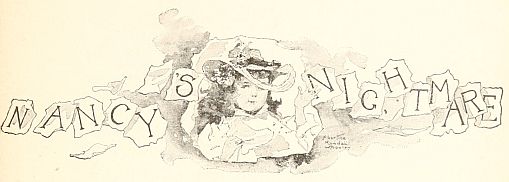
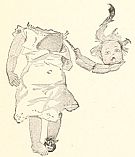
| I am the doll that Nancy broke!
Hadn’t been hers a week.
Punch me behind, and I sweetly spoke;
Rosy and fair was my cheek.
Now my head is rolled in a corner far,
My body lies here in another;
And if this is what human children are,
I never will live with another.
|
I am the book that Nancy read
For twenty minutes together.
Now I am standing here on my head,
While she’s gone to look at the weather.
My leaves are crushed in the cruellest way,
There’s jam on my opening page,
And I would not live with Miss Nancy Gay,
[130]Though I should not be read for an age.
| 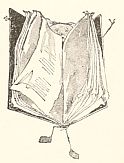
|
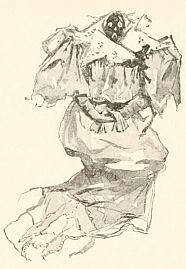
| I am the frock that Nancy wore
Last night at her birthday feast.
I am the frock that Nancy tore
In seventeen places, at least.
My buttons are scattering far and near,
My trimming is torn to rags;
And if I were Miss Nancy’s mother dear,
I’d dress her in calico bags!
|
We are the words that Nancy said
When these things were called to her view.
All of us ought to be painted red,
And some of us are not true.
We splutter and mutter and snarl and snap,
We smoulder and smoke and blaze.
And if she’d not meet with some sad mishap,
Miss Nancy must mend her ways.
| 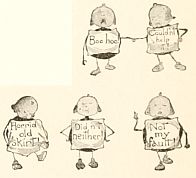
|
“John,” said little Amy, “did you ever send a valentine to anybody?”
John, the gardener, looked rather sheepish, and dug his spade into the geranium bed. “Well, miss,” he said, “I have done such things when I were a lad. Most lads do, I suppose, miss.”
Oh, that sly old John! He knew perfectly well that he had a valentine in his pocket at that moment, a great crimson heart, in a lace-trimmed envelope, directed to Susan, the pretty housemaid. But there was no need of saying anything about that to little miss, he thought.
“If you were not so very old, John,” continued Amy, looking seriously at him, “I should ask you to send me one, because my Papa is away, and I have no brothers, and I don’t know any lads, as you call them. But I suppose you are altogether too old, aren’t you, John?”
John straightened his broad shoulders and looked down rather comically at the tiny mite at his feet. “Why, Miss Amy,” he said, “whatever does make you think I be so very old? Your Papa is a good bit older than I be, miss.”
“My Papa!” cried Amy, opening her eyes very wide. “Why, John! you told me yourself that you were a hundred years old. And I know my Papa isn’t nearly so old as that!”
The gardener laughed. “More shame to me, miss,” he said, “for telling you what wasn’t true. Sure it’s only in fun I was, Miss Amy, dear, for I’m not forty years old yet, let alone a hundred. But I hear Mary calling you to your dinner; so[132] run up to the house now, missy, and don’t think too much of what old John says to you.”
Away ran little Amy, and John, left alone with his geraniums, indulged in a quiet but hearty laugh.
“To think of that!” he said to himself. “A hundred years old! Sure I must take care what I say to that young one. But the pretty lass shall have her valentine, that she shall, and as pretty a one as I can make!” and John dug his spade into the ground with right good-will.
(It occurs to me that you children who live in the North may say here, “What was he doing to the geranium-bed in February?” but when I tell you that little Amy lives in Virginia, you will not think it so strange.)
Saint Valentine’s Day was bright and sunny, and Amy was up early, flying about the house like a bird, and running every five minutes to the front door “’Cause there might be a valentine, Mamma!”
Presently she spied the postman coming up the gravel walk, and out she danced to meet him. Oh! such a pile of letters as he took out of his leather bag.
“Miss Amy Russell?” said the postman.
“Oh!” cried Amy, “she’s me! I mean me’s her! I mean—oh! oh! one, two, three, four, five! Oh, thank you, Mr. Postman! You’re the best postman in the whole world!” And in she danced again, to show her treasures to Mamma. Gold lace, silver arrows, flaming hearts! oh, how beautiful they were! But suddenly—ting! tingle! ding! a tremendous peal at the front door-bell.
Down went the valentines in Mamma’s lap, and off flew the excited child again. But this time, when she opened the door, no sound escaped her lips. Her feelings were too deep for utterance.[133]
There on the doorstep lay a valentine, but such a valentine! A large flat basket entirely filled with white carnations, with a border of scarlet geraniums, and in the middle a huge heart of deep red carnations, with the words “My Valentine” written under it in violets.
Amy sat down on the doorstep, with clasped hands and wide-open eyes and mouth. She rocked herself backwards and forwards, uttering little inarticulate shrieks of delight.
And John the gardener, peeping round the corner of the house, chuckled silently, and squeezed the hand of Susan, the pretty housemaid, who happened, curiously enough, to be standing very near him.
“Humph!” said John the gardener, “I haven’t forgotten how to make valentines, if I be a hundred years old!”
Once upon a time there was a little girl, just like you, who couldn’t count two. And she had a dreadful time about it! She did not know she had two feet, so she sometimes forgot to put on both her shoes; she did not know she had two eyes, so she would sometimes go to sleep with one eye, and stay awake with the other; she did not know she had two ears, so she would sometimes hear half of what Mamma said, and not hear the other.
One day Mamma called to her and said, “Pet, I want you to take this syrup and put it in my closet!”
Now Pet was only listening with one ear, and so she only heard the first half of what Mamma said: “I want you to take this syrup.” That was what she heard.[134]
She liked the syrup very much, for she had ten drops in a teaspoon whenever she had a sore throat, and she had always wished Mamma would give her more.
And now she was just to “take it.” That must mean to take the whole bottle, if she liked. She put the bottle to her lips and took a good long draught. It was more than half-empty when she stopped to take breath, and then,—the syrup did not seem to taste good any longer. She put the bottle down.
Oh—dear—me! In about ten minutes Pet was the very sickest little girl you ever saw in your life. Mamma put her to bed, and sent for the doctor, and she had to take four different kinds of medicine before she got well, not one of which tasted good at all.
So now, you see, it is a very good plan for little wee girls to learn to count two.
(To be sung to the tune of “The Monkey married the Baboon’s Sister.”)
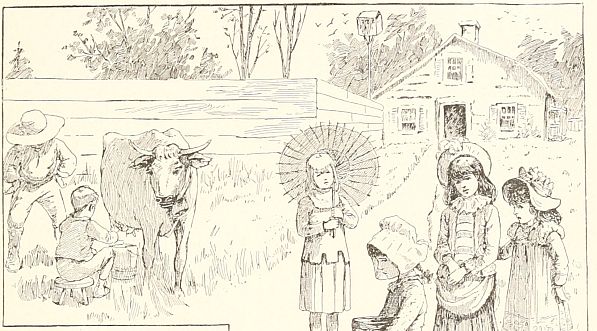
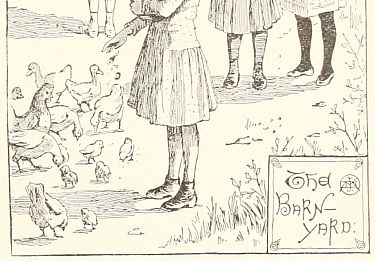
It chanced one day that Lucy came into the kitchen just as Fido, her Aunt Mary’s little dog, was eating his dinner.
He had a good dinner, and he was making a great fuss over it, growling with pleasure, shaking his ears and wagging his tail.
His tail was a very funny one, with a little black bunch at the end of it, and it wiggled and waggled this way and that way.
“Fido,” said Lucy, “I don’t think you ought to wag your tail when you are eating. Mamma says we must sit very still at the table. To be sure, you are not sitting, and you are not at the table, but, all the same, I think you had better not wag your tail.”
Fido paid no attention to these sensible remarks, but continued briskly to wag the offending tail.
“Do you hear me Fido?” said Lucy. “I say, don’t wag it!”
Fido gave a short bark of protest, but took no further notice.
“Then I must hold it for you!” Lucy continued, severely. “Mamma held my hands once when I would not stop cutting holes in my pinafore; but I was young then, and I thought the spots ought to be taken out. But you are not young, Fido, and I wonder at you, that I do!”
Then Lucy took hold of the tail, and tried to hold it; but Fido danced about, and pulled it away, and then wagged it all the harder, thinking she meant to play with him.
“Indeed!” said Lucy, “I am not playing, Master Fido. Now you shall see!”
So she got a piece of stout twine, and tied Fido’s tail to the leg of a chair.[137]
“There!” she said, “now finish your dinner, like a good little dog, and don’t give me any more trouble.”
But Fido would not eat his dinner with his tail tied up. He threw back his head, and gave a piteous little howl. Lucy sat down on a stool beside him, and folding her hands, as she had seen her mother do, prepared to give the naughty pet “a good talking to,” as nurse used to say.
At that moment, however, her mother’s voice was heard, calling “Lucy! Lucy! Where are you?”
“Here, Mamma!” cried Lucy. “I am coming! I meant to pick them up before dinner, anyhow! yes I did!” And she flew up stairs, for she knew quite well that she had set out all her doll’s dishes, tea-set and dinner-set and kitchen things, on the nursery floor, and left them there.
And now nurse had come in with baby in her arms, and had walked right over the pretty French dinner-set, and there was very little of it left to tell the tale.
Dear! dear! it was not at all nice to pick up the pieces, even if nurse had not been scolding all the time, and Mamma standing by with that grave look, waiting to see that it was properly done.
But how about Fido? Oh, Lucy had quite forgotten about Fido. But Fido had not forgotten himself, and a very hard time the poor little fellow was having.
He ran round the chair several times, till he brought himself up close against it; then he tried to unwind himself again, but only became more and more entangled. He pushed the hateful chair backwards till it struck a little table on which was a tray full of dishes. Over went the table, down went the tray, crash went the dishes!
“Yow! yow! yo-o-o-ow!” howled Fido.
“Oh! oh! oh!” shrieked Bridget, the cook, who came in at[138] that moment; and then—whack! whack! whack! went the broomstick over the poor doggie’s back.
The noise was so great that Mamma came flying down, and nurse and Lucy, too, with the broken soup tureen in her hand.
“Oh, don’t beat him!” cried Lucy, “don’t beat him, Bridget! It was my fault, for I tied him to the chair, and then forgot about him.”
“And why, for the pity’s sake, miss, did ye tie the baste to the chair?” said Bridget, still angry. “Look at every dish I have in the kitchen all broken in smithereens!”
“He would wag his tail while he ate his dinner,” faltered Lucy, “and I wanted to teach him better manners; and so—and so—” But here poor Goosey Lucy broke down completely, and sat down among the shattered dishes, and hugged Fido and wept over him.
And Fido, who had the sweetest temper in the world, wagged the poor abused tail (which had been quickly released by nurse), and forgave her at once.
And Bridget and nurse laughed; and Mamma kissed her little foolish daughter, and bade her not cry any more.
But Lucy had to go to bed, all the same, for Mamma said it was the only proper place for a child who had broken (or caused to be broken, which amounted to the same thing), seventy-two dishes, large and small, in less than half an hour. And I suppose Mamma was right, don’t you?
“Where are you going, Uncle Fred?” asked Lucy.
“I am going to make New Year’s calls, little girl,” replied Uncle Fred.
“And how do you make them? What are they made of?” inquired Lucy.
“Oh—ah—my dear child!” said Uncle Fred, who was looking for his umbrella in a great hurry, “they are not made of anything. You—ah—you just call, you know, on all the people you know. Oh, here it is! Good-by, little girl! I must be off.”
And off he hurried, leaving Lucy, mystified, in the hall.
“You just call!” she repeated. “Just call all the people you know. Why, that is easy enough, but what a funny thing to do!”
She pondered a few minutes and then continued, “I think I will go and make New Year’s calls. It must be great fun! Perhaps I shall meet Uncle Fred, and then we can call together, and that will be just twice as loud.”
Away ran the little girl to her room. Blue coat, blue leggings, blue mittens, swan’s-down hood, all were on in three minutes’ time; and without a thought of Mamma or nurse or anybody else, Lucy slipped out of the door, and ran merrily down the street.
Oh, how fresh and clear the air was! How the snow sparkled in the sunlight! What a fine thing it was to make New Year’s calls!
And now the question was, where she should call first. Why,[140] at Grandma’s, of course! her house was in the square, just round the corner. And then she would go to Aunt Maria’s, and then,—well, she would think about the next place as she went along, but here was Grandmamma’s house now.
Lucy looked up at all the windows, but no one was in sight.
So much the better! She planted herself squarely on the curbstone, and opening her mouth to its fullest extent, shouted, “Grandmamma! Grandmamma! Grandmamma!! GrandMAMMA!!!”
Her grandmother, who was sitting quietly by the fire, reading, heard the piercing screams, and running to the window as fast as her dear old feet could carry her, saw Lucy, panting and crimson, with her mouth just opening for another shout.
Something had happened at home,—an accident, probably! No time must be lost. Grandmamma threw up the sash.
“Run and call the doctor!” she cried. “Quick, dear! Don’t stop to tell me about it, but run! I will be there in three minutes!” And she shut the window, and trembling with anxiety, hastened to put on her shawl and bonnet, and almost ran through the snow to her daughter’s house.
Meanwhile, Lucy ran on in high glee. “I hadn’t thought of the doctor!” she said, “but of course I will go there, as Grandmamma wishes it. What fun it is!”
The doctor’s house was soon reached, and Lucy’s shouts brought the good man quickly to the door.
“Bless me!” he said, “Mrs. Graham’s little girl! Baby ill again, I suppose? All right, my dear!” he cried to Lucy. “I’ll be there instantly. Run and tell them I’m coming!” and he shut the door and called for his boots.
Lucy danced along, enchanted with her new play, and soon reached Aunt Maria’s house, where she called again, with might and main. Now, Aunt Maria was slightly deaf, and when she[141] heard her own name resounding in a clear, shrill scream, “Aunt Mari-i-i-i-ia!!” she thought it was a cry of fire!
Throwing up the window (she was a very nervous and excitable person), she shrieked, “Fire! fire! Police! watchman! Help! help! Fire!! FIRE!!!” till everyone within a dozen blocks heard her, and came rushing to the rescue with buckets and fire extinguishers.
Lucy was rather frightened at all this, and thought, on the whole, she would not make any more calls that day.
So she went home. And there were Grandmamma and the doctor and Mamma, all waiting for her, with very grave faces.
The two first had arrived, breathless and agitated, inquiring what had happened, and who was ill.
Much perplexity followed. And now that the author of all the mischief had arrived, what should be done to her?
Lucy’s finger went into her mouth, and her head went down.
But she told her story truthfully; and it was such a funny one that the doctor burst into a roar of laughter, and Grandmamma laughed heartily, and even Mamma could not look grave.
So Goosey Lucy had a lecture, and a New Year’s cookie, and went to tell her dolls all about it, while Mamma and Grandmamma and the doctor went to see how Aunt Maria was.
The Quacky Duck stood on the bank of the stream. And the frogs came and sat on stones and insulted him. Now the words which the frogs used were these,—
These were not pleasant words. And when the Quacky Duck heard them, he considered within himself whether it would not be best for him to eat the frogs.
“Two good things would come of it,” he said. “I should have a savoury meal, and their remarks would no longer be audible.”
So he fell upon the frogs, and they fled before him. And one jumped into the water, and one jumped on the land, and another jumped into the reeds; for such is their manner. But one of them, being in fear, saw not clearly the way he should go, and jumped even upon the back of the Quacky Duck. Now, this displeased the Quacky Duck, and he said, “If you will remove yourself from my person, we will speak further of this.”
So the frog, being also willing, strove to remove himself, and[144] the result was that they two, being on the edge of the bank, fell into the water. Then the frog departed swiftly, saying, “Solitude is best for meditation.”
But the Quacky Duck, having hit his head against a stone, sank to the bottom of the pond, where he found himself in the frogs’ kitchen. And there he spied a fish, which the frogs had caught for their dinner, intending to share it in a brotherly manner, for it was a savoury fish. When the Quacky Duck saw it, he was glad; and he said, “Fish is better than frog” (for he was an English duck)! And, taking the fish, he swam with speed to the shore.
Now the frogs lamented when they saw him go, for they said, “He has our savoury fish!” And they wept, and reviled the Quacky Duck.
But he said, “Be comforted! for if I had not found the fish, I should assuredly have eaten you. Therefore, say now, which is the better for you?” And he ate the fish, and departed joyful.
Hal woke up very early on Christmas morning, so early that it was still quite dark.
He crept out of bed and ran to the chimney, got his stocking, which had been hung there the night before, and carried it back to bed with him.
Oh, what a delightful fat, lumpy stocking it was! Why did not the daylight come, so that he might see what was in it?
This was an orange on top; he could tell that without seeing it. And this long, soft thing, which jingled as he pulled it out? Oh, a pair of reins! How nice! But what was this that came next?
Ah! little Hal must wait till daylight for that, for his tiny fingers refused to tell him what it was.
Wait he did, very impatiently, consoling himself with his orange.
But at last a little gray light came stealing in at the window, and two little bare feet went trotting across the floor, and two little hands held up a mysterious object to the light.
It was a chicken! a most beautiful yellow chicken, with bright black eyes and a little sharp beak, and,—oh! what was this? Why! why! the chicken’s head came off, and the chicken’s body was all full of sugar-plums!
“Oh! oh! oh!” cried little Hal. “Mammy! Mammy! come and look at dis chicken! He can spit his head out!”
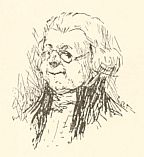
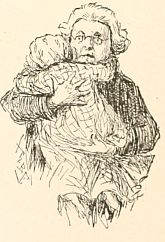
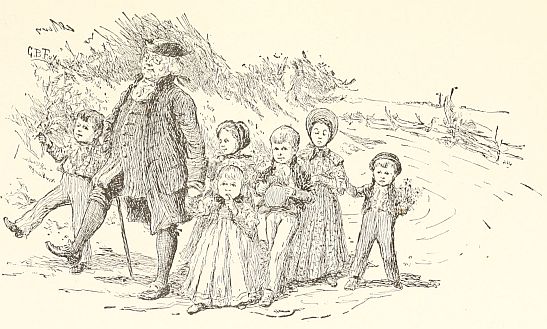
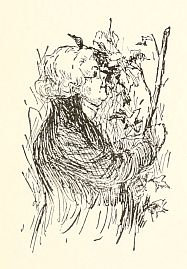
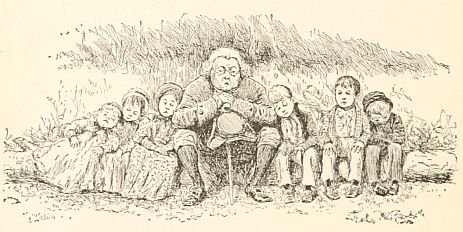
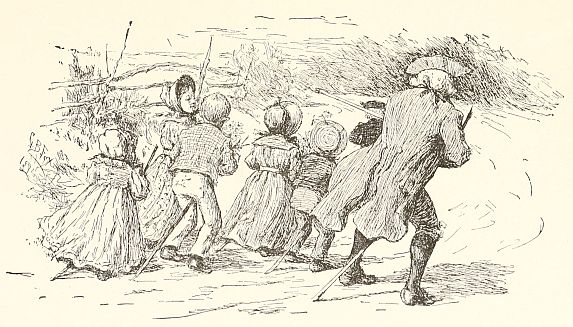
Shall I tell you what happened to Elsie one day? She was sitting on the beach in her green cart, which had lost both wheels, so that it was not of much use as a cart, though very nice to sit in. And presently, a purple fish, with a yellow tail, came and looked at her. And he said,—
Elsie smiled and answered,—
Then the purple fish took the string of the cart in his mouth and swam away. The cart bobbed up and down on the waves, and behaved quite like a boat, and Elsie clapped her hands, and laughed and sang. The fish swam on and on, till at length he came to a little island, all covered with purple hyacinths and yellow violets. Here he stopped and bade Elsie get out, saying,—
But Elsie did not like this at all, though the island was very beautiful. She shook her head resolutely, and replied,—
Then the purple fish was angry, and his yellow tail quivered with vexation. He said, sternly,—
And off he swam, taking the green cart with him. Poor Elsie was very unhappy, for she could not bear to think of spending her whole life on the island, and yet she did not want to marry a fish, even if her Mamma were willing, which she was quite sure she would not be. But, as she was sitting there, making a wreath of the yellow violets, two sea-gulls came flying by. They stopped when they saw Elsie, and one of them said,—
“There isn’t any such word as ‘chisland!’” said Elsie. “It is ‘child,’ don’t you know?”
“I am not very familiar with English,” replied the sea-gull. “The other word rhymes better; but I am not prejudiced. What are you doing here, child?”
“Nothing!” replied Elsie. “If you please, did you ever marry a fish?”
Both the sea-gulls showed strong signs of disgust at this, and said,—
“We eat fish, but never marry them. Why do you ask?”
“Because the purple fish with the yellow tail said I must stay here all my life unless I would marry him. And he has taken away my green cart, so that I cannot get home.”
“As to that,” said the sea-gulls, “we can easily manage to get you home. Put your arms around our necks and hold on tight!”
So the sea-gulls flew away with Elsie, and brought her safely home. She kissed them and thanked them.[157]
“What can I give you, dear sea-gulls,” she asked, “in return for your saving me from that horrid fish?”
“Could you give us your golden curls?” asked the sea-gulls. “We think they would become us, and they are a thing not often seen in our society.”
No, Elsie could not do that.
“But,” she said, “I can give you each a necklace of glass beads, fastened with a rosette of peach-coloured ribbon. I made them yesterday for my dolls, but you are welcome to them.”
“Just the thing!” said the sea-gulls.
So Elsie put the necklaces round their necks, and they thanked her, and flew away. I have been told that they flew straight to the island, and spent the whole afternoon in making rude remarks to the purple fish with the yellow tail, but one need not believe all one hears.
The sleigh had just driven from the door, with a great jingling and shouting, and the little boy was left at home, with his foot up on the sofa, for he had a sprained ankle. “I wish I could have gone!” said the little boy.
“You shall go!” said Sister Sunshine. “We will go together, you and I!”
She brought a great book, with bright pictures in it, and sat down by the little boy’s side.
“First, we must choose our carriage!” she said. There was a whole page of carriage pictures, all very splendid, and after some thought they chose a gilded shell, with the front turning over into a swan’s neck. An Empress of Russia had driven in this, the book said, and so they thought it was good enough for them. The horses were coal-black, and there were six of them, four more than Papa and the other children had. Sister Sunshine tucked the little boy well up, and it appeared that the robes were all of ermine and sable, whereas, he had been thinking that they were only a striped afghan. One does not always know things till one is told.
“Here we go!” cried Sister Sunshine. “How the horses dash along! It takes my breath away! We are going to St. Petersburg to see the ice palace on the Neva. The Empress has sent her own private sleigh to take the little boy, and I can go, too, because I belong to him.”
She turned the page, and there, sure enough, was the ice palace. The sun shone splendidly on it, and it looked as if the fairies had built it.[160]
“There is the Empress waiting for us!” said Sister Sunshine. “I suppose it would be polite to go in, wouldn’t it?” The little boy thought it would, decidedly, so they took the Empress’s hand and went in, through one grand room after another. The Empress gave them each a lovely little porcelain stove to carry under their arm, for the ice halls were cold.
“I am used to it,” she said, “and do not mind it.” She showed them all her jewels, which shone and sparkled like living flames; and then she brought them long sticks of candy, striped red and white, and cream walnuts, and barley sugar lions, just the things the little boy liked best; and they both said, how funny it was that she should know all about it, when the people at home so often forgot and gave him horehound, which he could not abide, and then said it was good for his cold.
After that they drove a long way over the ice, and the little boy thought he would like to go to Egypt and see if they knew their lessons about Moses there, because he sometimes forgot his. And there was Egypt, just a few pages off, with lots of pyramids, and the Sphinx, and all the right Egypty things. They got on camels and went to find some children, and there, to be sure, were plenty of them, all looking just exactly like the pictures in the Bible; but not a single one of them knew anything about Moses, which made the little boy feel more puffed up than he had any reason to be.
They left the carriage and got into a Nile boat, because they wanted to go over the Cataracts, and Sister Sunshine thought the horses might not like it; but before they got to the very first one the little boy was sound asleep, and he never woke up till the others came home from their sleigh ride. He was quite sure that they could not possibly have had so good a time as he had; and, anyhow, nobody had given them so much as a single bite of candy; they said that themselves.
A great many queer things happen in this world, and this morning I saw one of them. We have a little aquarium,—just a long glass box, with some stones arranged in it to form a pretty little rock-work, and plenty of bladder-wort for the fish to feed on.
We have a good many fish,—three stickle-backs, and a lot of dace, the pretty silver dace, and some minnows and a crayfish; but the pride of the aquarium is the newt. Did you ever see a newt? He is a little creature, like a lizard, about two inches long; in color, light brown, with black spots. He is quite tame, and not in the least afraid of us. Well, yesterday morning I was watching the fish, and seeing that the greedy ones did not get more than their share of breakfast, when Master Newt came up out of the water and seated himself on the top of the rock-work, which projects an inch or two above the surface. He sat quite still for a few minutes, and I made no motion, thinking he had come to take a look at the upper world, and would prefer to be left to himself. Presently he began to move his little paws about (they are just like tiny hands, with long, thin fingers), and to rub himself, and wriggle about in a very queer way. I had watched him for some minutes before I realized what he was doing, but suddenly it flashed upon me that he was going to change his skin. I knew that newts often changed their skin, but I never expected to see one do it. Presently it was loose enough, and my little friend began to draw it off, slowly, beginning with the paws. The skin came off in perfect shape, and in a moment there was a pair of fairy gloves floating in the[162] water, the prettiest things that ever were seen. Next, Master Newt began to unbutton his waistcoat, so to speak, and then to take off coat, waistcoat, breeches and all. He did look very fine in his new coat, which shone with lovely colours, and was as soft and smooth as gossamer. I thought I should like to have a new dress every day if I could manage it with no more trouble than this. But what was he going to do with his old clothes? There were no closets in the aquarium, no clothes-bags, no obliging old-clothes-fish who would take it off his hands and give him a trifle for it. What would he do with the old suit?
I was soon to see. Master Newt sat still for a few minutes after his great feat, seeming to enjoy the change, waving his delicate crest with evident satisfaction; then he took up the old suit of skin, which lay on the rock beside him. And then,—who can guess what he did next? Mind, I saw this with my own two eyes, the very ones that are looking down on this paper as I write. Why, he rolled it up carefully, made a ball of it, and then ate it up!
It was a perfect snowball day! There had been a heavy snowstorm, and then the sky had cleared and the weather turned soft and warm. What could be more delightful?
Rita was too little to go to school, but she was not too little to make snowballs.
So Mammy put on the little girl’s coat and hood, and leggings and overshoes and mittens, and turned her out of doors in the sunshine.
Oh, how bright it was! How the world sparkled and twinkled and laughed! Rita laughed, too, and at first could only jump up and down for pure joy, and sing,—
A song of her own composition, of which she was justly proud.
But presently she said to herself, “snowballs!” and from that moment she had no time for singing or jumping.
First she made some dumplings, and set them in a row on the piazza to bake in the sun; then she saw three little birds in a tree, and threw the dumplings at them, in case they might be hungry.
Then she made a pudding, and stirred it with a large icicle, which made the best possible pudding stick; then she made some eggs, and pelted Rover with them till that good dog fairly yelled with excitement.
At last she said, “I know what I will do! I’ll make a Great Snowball, like the Great Sausage in my German picture book.”[166]
So the little girl set to work, and rolled and patted and pressed till she had a well-shaped ball to begin with. Then she laid it on the smooth snow table-cloth of the lawn, and began to roll it in good earnest, here and there, over and over and over.
The snow was in perfect condition, soft and moist; every particle clung to the ball, which grew bigger and bigger and BIGGER and BIGGER!
At last Rita’s arms were tired, and she stopped to rest and to look about her. She was at the end of the lawn, where the bank sloped up to the stone wall. How nice it would be if she could roll the Great Snowball up the bank, and push it to the top of the wall!
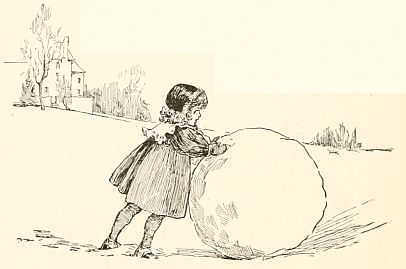
Then Papa would see it when he came home to dinner, and he would be so ’stonished! he would say, “Who—upon—yerth—put that great, hugeous snowball there?” And Rita would say, “I did, Pappy! just ’cisely all my own pitickiler self.”
And then Papa would say, “Why-ee! what a great, big girl my Rita is! I must take her to town to-morrow-day, and buy[167] her a muff, and a doll with wink eyes, and a squeaky dog, and a prayer-book, and a nalbum, and big boots, and a gold watch and a stick of striped candy! and then—” But by this time Rita was quite ready to go to work again.
The snowball was very big by this time, quite as big as she was; and the bank, though not high, was very steep. But Rita’s short arms were sturdy, and her courage knew no measure; so at it she went, pushing the great ball up, inch by inch; puffing, panting, her cheeks growing redder and redder, but with no thought of giving up.
Now, by this time the snowball began to have its own ideas. Just at what point of bigness a snowball begins to have a mind of its own I cannot tell you, so you must ask some one wiser than I; but this snowball had reached the point.
At this moment it was saying to itself, “What fun this child is having! but I do not enjoy it at all. It is the pushing that is the fun, apparently. Why should not I push the child? I am bigger than she; it would be very pleasant to roll down the bank, and push her before me. I might try! I think I will! There!”
Down went the snowball! Down went little Rita! roly-poly, rumble-tumble, ruffle-puffle, flop!
When Papa drove into the yard, two minutes later, he saw a great mound of soft snow, with two little black legs sticking out of it.
“Never mind!” said Rita, shortly, when Papa had pulled her out, and she stood shaking the snow from her wet, rosy face, “the old thing didn’t hurt me a bit, and it broke its old self all—to pieces!”
The first I heard of it was when Fred came rushing into the house after breakfast.
“The enemy!” he cried. “The enemy is upon us!”
“Where?” cried the rest of us, jumping up.
“In the battle-field, of course!” he said; and he seized his flag and rushed out again.
We followed as quickly as we could. I put on the helmet, and Max took the drum, and we let Toddles have the bugle this time, because he had just tumbled down; and he had the hearth-broom, too, so he was all right. We ran into the field, and found that the enemy had taken up a strong position behind the old cannon. (Ours is a real battle-field, you know, and has been there ever since the war.) We formed in line, and Fred made a flank movement, meaning to take the enemy in the rear; but when he heard Fred coming, he charged on our line, and Toddles ran away, but Max and I retreated in good order, and formed again behind a rock, and began to shell him with green apples. He stopped to eat the apples, and meanwhile Fred completed his flank movement, and falling on the enemy’s rear, whacked it violently with a stick, waving his flag all the time, and shouting, “Yield, caitiff! Yield, craven hound!” (I tell him that nowadays people don’t say those things in war, but he says that Roland and Bayard did, and that what suited them will suit him.)
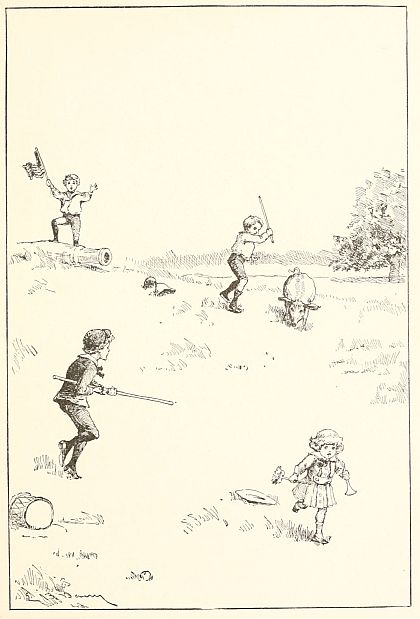
Well, the enemy turned suddenly on Fred, and drove him
back against the cannon: but by that time we had advanced
again, and Toddles was blowing the bugle as hard as he could,[169]
[170]
[171]
which seemed to disconcert the foe. Fred took a flying
leap from the cannon right over his back, and putting himself
at our head, rallied us for a grand charge. We rushed
forward, driving the enemy before us. A panic seized him, and
he fled in disorder; we pursued him as far as the fence, and he
got through a hole and escaped, but not before we each had a
good whack at him. It was a glorious victory! Fred made us
a speech afterward from the top of the cannon, and we all
waved everything we had to wave, and vowed to slay the invader
if ever he dared to show his nose on our side of the fence
again.
So that was all!
“Who was the enemy?” Why, didn’t I say? Farmer Thurston’s pig, of course!
The trees were still bare, and the grass brown and sere in the Northern city; but the sky was blue and cloudless, and the air warm and soft. On a bench under one of the leafless trees in the park sat an old man, gray-haired and poorly clad. His eyes were fixed on the ground, and he was thinking of many sorrowful things. Suddenly he heard a little clear voice saying, “Didn’t they give you any flowers?”
He looked up and saw a little wee girl standing before him, with her hands full of flowers. She had a round, rosy face and round blue eyes, and a little round rosebud of a mouth; and she was looking at him very seriously indeed. “Didn’t they give you any flowers?” she repeated.[172]
“No, dear,” said the old man, gently; “nobody gave me any flowers. Where did you get your pretty posies?”
“In church, of course,” said the child. “The minister gives us all flowers. You shall have some of mine,” and she took some sprays of lily of the valley and a red rose and laid them in the old man’s withered hand. “Does that make you glad?” she asked, anxiously. “The minister says everybody must be glad to-day.”
“Why must everybody be glad, my little angel?” asked the old man, sadly.
“Because Christ the Lord is risen,” said the child. “Didn’t you know that? Don’t you know that this is Easter Day?”
The old man smiled, and raised the flowers to his lips and kissed them. “I have been ill, my little angel,” he said, “but you have made me almost well again, and I will be glad! Christ the Lord is risen indeed.”
“Hallelujah!” cried the child, eagerly.
“Hallelujah!” echoed the old man, reverently.
“Hallelujah!” sang the bluebird in the leafless tree.
“Hallelujah!” said the whole wide world.
“I am going to be merry all day long!” announced Wilfrid over his baked potato. “It is Merry Christmas and I’m going to show you how to be merry.”
“How?” queried Ben and Kitty.
“Why, it’s just—just to be merry!” replied Wilfrid, loftily. “No matter what happens, all day long, we must laugh. If you fall down stairs, Ben, as you did yesterday, instead of howling, just laugh! You’ll see—ow! this potato is awfully hot. I’ve burned my finger like fun.”
“Ha! ha! ha!” shouted Ben and Kitty, as loud as they could.
“What are you laughing at, I should like to know?” cried their brother, looking up rather savagely from the finger he was nursing. “I don’t see the joke! Guess if it was your finger—”
“Merry Christmas!” cried Ben.
“We are laughing ’cause you told us to, Willy!” said Kitty. “Oh, isn’t it funny, brother burned his finger! Why don’t you laugh, too, Willy?”
Wilfrid was silent a moment; then he gave a forced laugh. “Of course!” he said, glancing rather sheepishly in the direction of Papa, who sat quiet behind his newspaper, and appeared to be taking no notice. (“But you never can tell whether he really is or not,” he reflected.) “Of course! I didn’t say I should laugh if you hurt yourselves, children, but it’s all right. You see I laugh, though I really hurt myself very much indeed” (with another glance at Papa)! “Come, now! what[174] shall we play till it’s time to get ready for church? I vote for ‘Old Man I’m on your Castle!’ We can play right on the hearth-rug here, and I’ll be ‘Old Man.’”
“I want to be ‘Old Man!’” protested little Kitty. “You’s always ‘Old Man,’ Willy!”
“’Cause I’m the oldest!” responded her brother, promptly. “Come on, Kitty, and laugh, you know! Don’t look as if I had trodden on your toes just because you want to be ‘Old Man.’ We must laugh all the more when we don’t get the things we want, don’t you see?”
The game went on merrily, and all three were laughing with right good-will, when Wilfred caught his foot in a corner of the rug and fell, striking his head pretty sharply against the table. He was dazed for a moment, but as the children’s laughter rang out, he started to his feet with looks of fury.
“You hateful little things!” he began, crimson with rage.
But at this moment another laugh was heard. Papa put down his newspaper and began, “Ha! ha! ha! ho! ho! ho! this is Merry Christmas, indeed! Why don’t you laugh, Wilfrid, my boy? Ho! ho! this is remarkably funny. Why don’t you laugh? Why, this is the best joke I have heard to-day. Go to your mother, dear, and ask her to put some arnica on your head, but don’t forget to laugh all the way.”
“That is the worst of Papa,” said Wilfrid to himself, as he went slowly up stairs, rubbing his head, and casting baleful glances at the two little laughing children.
“He always makes you do things—when you say you are going to—even if they don’t turn out a bit the way you thought they would.”
Once upon a time there came to the town where all the little dogs live a strange little dog, whose tail was of a most beautiful bright green color,—so bright that it shone like an emerald. Now, when all the other little dogs saw this, they were filled with admiration and envy, and they ran to the strange little dog and said,—
“Oh, little dog! what makes your tail so beautifully green? Pray tell us, that we may make ours green too, for we never saw anything so lovely in all our lives.”
But the strange little dog laughed and said, “There are many things greener than my tail. There is the grass down in the meadow; go and ask that what makes it green, and perhaps it will tell you.”
So all the little dogs ran down into the meadow where the grass was growing, and they said, “Oh, grass, grass! what makes you so green? Pray tell us, that we may all get green tails, like the tail of the strange little dog.”
But all the little blades of grass shook their heads, and said, “We can tell you nothing about that. All we know is that we were down under the ground last winter, and that when we came up this spring, we were all green. You might try that, and perhaps it would make you green, too.”
So all the little dogs went to work as fast as they could, and dug holes in the ground; and then they got into them and covered themselves up with earth. But they very soon found they[176] could not breathe; so they were all obliged to come up again. And when they looked at each other, they saw to their sorrow that they were not green at all, but just the same colours that they were before,—some black, some brown, and some spotted. Then they all went again to the little dog, and said,—
“Oh, little dog, little dog! we have been to the grass, and it has not helped us at all. Now, do please tell us what makes your tail so beautifully green, for we never can be happy till ours are like it.”
But the strange little dog only laughed again and answered, “My tail is not the only green thing in the world. There are the leaves on the great oak-tree; they are very green indeed. Go ask them what makes them so, and perhaps they will tell you.”
So all the little dogs ran as fast as they could to the great oak-tree, and called out to the little leaves, “Oh, little leaves! what makes you so beautifully green? Do tell us, that we may all get green tails, like the tail of the strange little dog.”
But the leaves all shook their heads, and said, “We know nothing about that. We came out of our buds last spring, and then we were very pale. But we danced about, and the more we danced the greener we grew. Perhaps if you come up here and dance, you will grow green, too.”
So all the little dogs climbed up the tree as fast as they
could, and tried to dance about on the branches. But they
were not fastened on like the little leaves, so they fell down and
hurt themselves very much; and when they got up and looked
at each other, they were not any greener than before. So then
they all cried bitterly, and they ran once more to the strange
little dog, and said, “Oh, little dog, little dog! we have tried
the way that the leaves told us, and we have only hurt ourselves
dreadfully, and have not got green at all. And now, if you do[177]
[178]
[179]
not tell us, we shall die of grief, for we never can rest again till
our tails are green.”
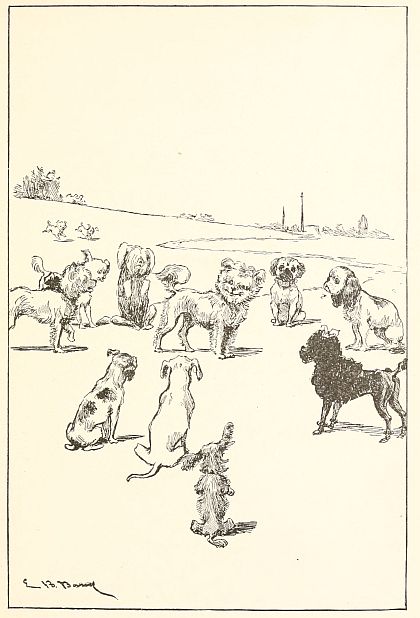
But the strange little dog only laughed more than ever, and said, “What stupid creatures you are, to think that there is nothing green in the world except my tail. There is the Sea; he is twenty times as green as my tail. Go and ask him, and he will surely tell you all about it, for he is very wise and knows everything.”
So all the little dogs ran as fast as they could down to the shore; and there was the great hungry Sea, prowling up and down, twirling his white moustaches and tossing his white hair, and looking very green and very fierce. The little dogs were very much frightened, but they took courage when they thought of the beautiful green tail, and they said, trembling,—
“Oh, great Sea! the strange little dog told us that you were wise and knew everything, and that you would tell us how to make our tails green like his.”
The great Sea smiled, wickedly, and answered, “Oh, yes, my children, I can tell you! I am green myself, and I make everything green that touches me. So let me take you in my arms a moment, and you will become beautifully green, just like me.”
So the great hungry Sea held out his long, green arms, and beckoned to them with his white hands; and the poor little dogs all shut their eyes and jumped in, and in less than a minute the Sea gobbled them all up, so that not one was left. And there was an end of all the little dogs.
And the strange little dog went back to the place he came from, with his green tail curled up behind him; and he was never seen or heard of again.
“No Christmas for us this year!” said Fred, coming out of his father’s study with his hands in his empty pockets, and a blank look on his face.
“No Christmas?” cried Edith. “What do you mean, Fred?”
“Hard times!” said her brother. “Father says he shall have all he can do to get through the winter, and that we mustn’t expect presents, or anything of that kind. Of course it’s all right, only,—it will seem queer, won’t it?”
“Oh, no money Christmas!” said Edith, looking relieved. “Yes, I knew that before. But we can have a merry Christmas, Fred, without money. I mean to have a particularly merry one, and you must help me.”[181]
“I should like to know what you can do without any money!”
“Wait and see! and come out into the woods with me this afternoon, that’s a good boy!”
It was about a month before Christmas when this conversation took place; and all through December there were no busier young people in Woodville than Fred and Edith Brown. They slighted none of their lessons; but Fred spent a good part of his home time in the barn, with a hammer in his hand and a Latin grammar at his elbow; while Edith’s knitting needles flew as she bent over her history lesson. The day before Christmas, Papa and Mamma were summoned to dine and spend the day with Grandmamma. Mamma rather wondered that the children were not invited, and did not want to go without them; but their faces grew so direfully long at this suggestion that she saw through the little plot, though Papa did not, and she cheerfully took her shawl and departed, charging Edith to keep up the fire, and Fred to take care of the house.
When the parents returned in the evening the house was a bower of green. “Here is one thing that costs nothing!” Edith had said, “and it is half of a merry Christmas.” So she and Fred had brought great armfuls of fragrant cedar and hemlock, and tall fir saplings, which were set up in every corner, while wreaths hung in the windows, and long garlands festooned fireplace and picture frames. Papa looked very much pleased. “Why, it is Christmas already!” he said. “And I thought we should not have any celebration at all this year. You were too bright for me, children.”
“It’s all Edith, Papa!” said honest Fred.
“All but about two-thirds, Papa!” said Edith. “I could have done nothing without Fred’s strong arms.”
Next morning the sun was out, and the snow sparkled like[182] diamonds in the golden light. “Here is something else that costs nothing, Edie!” cried Fred, who had entered heart and soul into his sister’s idea. “Sunshine is a pretty good present, isn’t it? And we have the very best article to-day.”
“Hurrah!” cried Edith, “this is glorious. Merry Christmas, boy! Smiles are another thing, Fred. Let’s be sure not to look gloomy for a single minute all day.”
“All right!” said Fred. “I’ll grin like the Cheshire cat from morning till night. Now, here’s mother’s work-table, all ready. It has taken a good polish, hasn’t it?”
“Splendid!” cried Edith. “And here’s father’s portfolio. Do you recognize the cover, Fred?”
“Looks like that pretty dress you had ever so long ago, when you were a little shaver,—I mean shaveress!”
“Just what it is! The pieces were folded away all this time, of no use to anybody. And there was enough to make this pretty work-bag for mother, and another like it for Aunt May. And,—look here, Fred! Merry Christmas, dear old fellow!”
Fred looked at the blue and gray toboggan cap with astonishment and delight. “Oh, Sis, that is a stunner! But, I say! you have broken the rule. This wool must have cost you something, and a good deal.”
“Not a penny!” rejoined his sister, triumphantly. “Do you remember that huge old comforter that Aunt Eliza sent me three years ago? I never could wear it out, though it was just as dear and kind of her to make it for me. That gave me the wool for the cap, and for several other things beside.”
“Well, it is a beauty!” said Fred. “Here’s all the present I have for you, and I wish it was a better one.” He produced a birchbark basket, filled with chestnuts and hickories, and was rewarded by a good old-fashioned hug.
“As if you could have found anything I should have liked[183] better!” cried Edith. “Such beauties, too! Why, you must have picked out every single nut, Fred Brown!”
“Something like it!” admitted Fred.
“How about those partridges for dinner?”
“They are all ready to put in the oven!” Edith said. “Mother knows nothing about them yet, but is sighing a little because she has no chicken for us. And you know Mrs. Spicer gave me a jar of mince-meat for the cranberries I brought her. I am a little proud of my pie, Fred!”
“Hurrah for you!” said Fred.
Somehow or other the Browns had never had a merrier Christmas than this one of the hard winter. Edith said it was all the sunshine and the green boughs; Fred said it was all Edith; but Mr. and Mrs. Brown, as they sat by the cheerful hearth, and watched the chestnuts roasting, and listened to the merry young voices, gave reverent thanks for their treasure of love, and felt that they were rich in spite of the hard times.
Do you know, children, how and where all the valentines are made that you see in the shops nowadays?
Well, suppose I tell you all about it.
When you go to fairy-land, turn to the left after you enter the gate, and the first house you come to will be Saint Valentine’s.
This is what I did when I went there, and you shall hear what I saw.
On entering the house, I found myself in a large hall hung with gold and silver paper, and glittering with an incomparable brightness. Here were hundreds of little cupids with tiny wings, who were running and flying about, as busy as bees.
One was carrying a roll of gold paper as big as himself; another was painting beautiful flowers on white paper; others were making paper lace. But all seemed to be helping and waiting on a person who sat by a huge table at the farther end of the hall, and this person I soon found to be Saint Valentine himself.
He was a young man, and very handsome. He was dressed in sky-blue velvet, embroidered with gold, and had great fat pearls for buttons. He seemed as busy as the rest, and merely nodded and smiled when he saw me, and called out,—
I heard a queer, sharp voice at my elbow, saying, “Now, then, by your leave!” and turning, saw at my elbow an enormous[186] pair of shears, walking about on two legs, and looking as proud as you please.
said Saint Valentine.
Snip-snap! snip-snap! went the shears, and there lay a million little sheets of white paper.
Then the Saint cried,—
and a dozen cupids came up, dragging a great basket full of hearts, and carrying bundles of darts under their arms. Quick as lightning, Saint Valentine took a couple of hearts out of the basket, clapped them on a sheet of paper, stuck a dart into them, flung a wreath of flowers round them, then, thump! a great stamp came down on the paper, and out of it came a lovely valentine.
That was quick work! in five minutes, I should think, five hundred valentines were turned out. I stood looking on in delight.
Suddenly the Saint called out,—
At first I did not know what he meant: but he took an enormous sheet, and after showering hearts and roses and cupids upon it, turned to me, and said, sweetly,—
This was too much, and making him a low bow, I awoke!
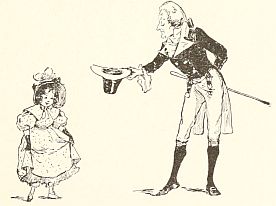
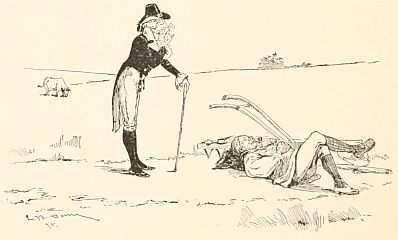
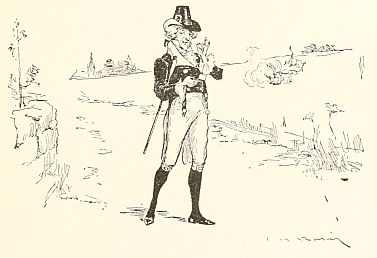
“To-morrow is my birthday!” said Robby to Bobby.
“What is your birfday?” said Bobby to Robby.
“Why, to-morrow, Silly!” said Robby.
Now Robby was nearly six years old, and a person of great importance.
“I don’t mean that!” said little Bobby, who was not yet four. “I mean, what is our birfday? Is it good to eat?”
“Why! why-ee! Bobby Bell! Don’t you have birthdays?” cried Robby, opening his eyes.
“No!” said Bobby, opening his mouth. “I neber saw one.”
“You don’t see them!” said Robby, in a patronizing tone, “you have them! It is the day you were born, and you have a party and presents, and a birthday cake with frosting, and your name on it in pink letters, and candy and oranges, and a gold dollar with Grandmamma’s love to her dear little boy. Do you really mean that you never had one, Bobby Bell?”
Little Bobby looked very grave. “Perhaps I wasn’t born!” he said. “I’s going to ask Mamma.” So he trotted in to his mother.[191]
“Mamma,” he said, “was I born?”
Mamma looked at him a moment in mute surprise. “Were you born, dear?” she repeated. “Yes, certainly you were born. Why do you ask me that, little boy?”
Bobby’s lip began to quiver, and his blue eyes filled with tears. “Den why,—why don’t I have birfdays?” he asked.
Mamma looked very sorry. “Dear! dear!” she said. “Now who has been telling my leap year boy about birthdays? Come and sit in Mamma’s lap and tell me all about it, and then I will tell you all about it.”
So Bobby climbed up into Mamma’s lap and hid his face in her dress, and sobbed out his little story about frosted cake and pink letters, and gold dollars with Grandmamma’s love to her dear little boy. “And I neber—I neber had any!” he said, piteously.
Then Mamma told Bobby a funny little story. It was about the years, and it told how they came along, one after another, and how each year had just the same number of days in it.
That is what each one says before it puts on its nightcap and goes to sleep.
But every fourth year there comes one who is bigger than the rest. He has one day more, and he is very proud of it, and holds his head very high, and says,—
“And so four years ago,” said Mamma, “there came one of these extra days, and it was the very best day that any year ever brought, for on that day my Bobby was born! Think of that!”
Bobby laughed and clapped his little fat hands.
“And so,” continued Mamma, “of course my Bobby couldn’t have another birthday till another long year came round, with another extra day. And now,—whisper, Bobby! now the long year has come, and next Friday is your birthday, dear, and you are going to have—oh! but I mustn’t tell!”
Mamma laughed and shook her head, and didn’t tell any more, but her eyes told a great deal; and that was all Bobby wanted, for he was very fond of surprises and secrets.
He hugged Mamma, and then he hugged himself, and then he went and hugged the kitten, and told her all about it, and what he thought he was going to have.
Well, and it all came true, and a great deal more; for Bobby had the finest birthday that ever any little boy had, or any little girl, either. In fact, it was so very fine that I couldn’t possibly write about it in common black ink on white paper. I should have to take silver paper and gold ink; and I cannot do that, so I shall have to stop now. Isn’t that too bad?
The Crimson Crab was to be married to the Eldest Frog. The wedding guests were assembled on the great water-lily leaf, in their best dresses and best spirits. There were lizards and water-beetles, dragon-flies and butterflies,—in fact, all the best people of the neighbourhood. The musicians, young frogs of remarkable talent, were stationed with their instruments in the pink buds of the lily; in the largest blossom the bride was completing her toilet. But she wept as she polished her shining claws, and her feelers shook with grief; for she did not wish to marry the Eldest Frog. He was gray and grizzly, had no voice save a dismal croak, and was known to have an odious temper. The Crimson Crab thought of the gallant young Green Frog, whom she had met at the Pollywogs’ Ball. How handsome he was! She had danced nearly every dance with him, and he had pressed her claw tenderly, and whispered sweet words in her ear. Then, the next evening, he came and sang beneath her window; ah, how he sang! When the song was over he leaped lightly upon the window-sill, poured out his tale of love, and gained her promise to be his bride. Ah, moment of rapture! She thrilled even now with the recollection of it. But he vanished, and—she had never seen him since. She was told that he had disappeared, had probably gone to the Muskrat War, and been killed in battle.
Alone she sat and wept, till her stern father came and told her that she was to be the bride of the Eldest Frog. Vain were her tears, vain her entreaties. Preparations for the wedding were at once begun, the fine clothes were ordered, and now the fatal day was come.[195]
“Alas!” cried the Crimson Crab, “why am I beautiful? Why does this lovely carmine mantle in my shining shell? If I were a plain green crab the Eldest Frog would not have sought me out, and I might still sit in my lonely bower and weep for my lost love.”
At this moment her father’s summons came, and she was forced to dry her tears.
“Console yourself, noble Lady!” cried her faithful Attendant Lizard. “See the beautiful gifts your bridegroom has sent you. A girdle of pearls! a mantle of glittering fish-scales! webs of gossamer, the finest that ever were seen! Never was bride so richly decked. So generous a bridegroom as the Eldest Frog is sure to make a kind husband.”
But the bride only sighed the more, and sadly took her way toward the great leaf, whereon the wedding guests were assembled.
The Eldest Frog was dressed in his best. His speckled coat was new, and his yellow breeches fitted to perfection; but for all that he was old and ugly. He leered at the bride with his goggle-eyes, and grinned till the two ends of his mouth nearly met behind.
“Croak! croak!” he said, laying his hand on his heart. “Ah! the fair bride! Ah! the lovely Crimson! What happiness to win the love of such an exquisite creature!” He held out his withered hand, and advanced a step or two; but at the same instant a voice was heard, crying, “Villain! do not dare to touch her!” and leaping across the lily-leaf, his eyes flashing fire, his bulrush spear in his hand, came the Green Frog.
With one thrust he sent the Eldest Frog sprawling on the floor. Then, while all the company looked on aghast, he caught the Crimson Crab in his arms, and hailed her as his bride. “This villain lay in wait for me,” he cried, “and captured me[196] unawares the very night when last I saw thee, my own. For weeks I have lain fast bound, hand and foot, in a dungeon deep under the mud. To-day I was set free by a faithful Horned Pout, whom I had formerly befriended. Fly with me, my bright, my beautiful! My home among the reeds is lowly, but love will make it rich. Away! away!” He seized the slender claw of the Crimson Crab; and before her father could prevent it, the two had leaped from the leaf, and were scuttling swiftly through the clear water.
All the guests followed,—that is, all who could swim,—to see what would become of the venturous young couple. The old Crab went into his hole and sulked; while as for the Eldest Frog, he just lay on his back where his rival had thrown him, gasping and gurgling, and nobody took any notice of him, till at last a fat brown duck came along, and—gobbled him up!
Once upon a time there were some children, and once upon a time there were some ducks. It was upon the same time, too, and they all lived together in one house. That was funny, wasn’t it?
And there were two reasons for it. In the first place, it was so cold where they lived that the ducks could not stay out of doors, except in summer; and in the second place, the good man of the house, the children’s father, was so poor that he could not afford to have a separate house for the ducks.
Indeed, there were only three rooms in the house. One was the kitchen, which was parlor and dining-room and sitting-room as well, and one was the children’s room, and the third was the parents’ room. So there they all lived together, and they were very sociable. The names of the children were Greta, Minna, Lisa, Carl and Baby Fritz. The names of the ducks were Red-top, Waggle-tail, Gobbler and Spottle-toe; and the children were all good, but the ducks were all naughty, as you shall hear.
The father had made a nice wooden box for the ducks, and this was always filled with hay and kept beside the great porcelain stove in winter, so that the pets might be warm. But were they grateful for this kindness? Not a bit of it. They were always getting out of their box and poking their bills into all sorts of places where they had no business to be. You might find Waggle-tail inside the mother’s Sunday cap, and Gobbler tasting the soup on the table, and Red-top and Spottle-toe pulling the baby’s doll to pieces. These were things that happened every day. And, indeed, what else can be expected, when one[201] keeps one’s ducks in the kitchen? But one day something very much worse than all this came.
The mother was ill, so ill that she was obliged to stay in bed and send for the doctor, and that was something very unusual. The doctor came and gave her a box of pills, telling her to take one every day until she was better. He told her to put her feet in a hot mustard-bath, as that would draw the pain down from her head; then he patted the children, and mounting his old gray pony, rode away again.
Well, the mother took her pill, and then closed her eyes for a short nap, laying the pill-box down on the low stool beside the bed. Presently Greta, the eldest daughter, came in with the hot foot-bath, and seeing her mother asleep, set it down softly and went out again to get the warm shawl that the good woman would need when she sat up.
Now, it happened that she left the door open, and as this was what the four ducks had been waiting for all day, they immediately waddled into the mother’s room. Poking about in their usual way, they soon found the box of pills, and supposing them to be something particularly nice, they gobbled them all up in the twinkling of an eye. Now, you know that pills are not apt to be nice, and these pills were very particularly nasty, as the ducks soon found out.
“What’s this?” said Gobbler.
“Ugh! quack! ugh! What is it?” exclaimed Red-top.
Waggle-tail had swallowed four pills, and his feelings were too deep for words. His one thought was “something to drink!” and seeing the foot-bath, he plunged his bill in and took a good draught of the hot mustard and water.
Oh, then, what a clamour arose! The other ducks had hastened to follow his example, and now they were all screaming and sputtering and flapping their wings in a way that was[202] dreadful to hear. The poor mother woke up in a fright; Greta and all the children came rushing in, followed by the dog; finally the father came, armed with a heavy stick, and the terrified ducks were driven out of doors, where they sat, shivering, on the doorstep, declaring that they would never eat or drink anything again.
FOR BETTY.
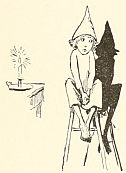
| Ethelred Unready,
He would not go to beddy.
Sat up all night,
Till his nurse died of fright,
With a nightcap over his heady.
| 
|
Bonny was only six years old when it happened. He went to the mill, one day, with his uncle, riding in front of him on the old gray mare, while the bags of corn hung over on each side.
While Uncle Allen talked with the miller, Bonny ran about, peeping here and there; and at last he strayed off into the pasture to see the red calf with the three spots on its nose. He was gone so long that Uncle Allen thought he had run away home, so he rode off with two bags of flour instead of the corn.
Bonny was rather frightened when he found he must go home alone through the woods, a distance of three miles, but he was a sturdy little fellow, and would not let the miller know that he was afraid.[206]
Off he trudged, with his hands in his pockets, whistling the merriest tune he knew, to keep his courage up,—“Tra la lira la!” Very gayly it sounded through the bare woods, for it was early spring, and the leaves were only just beginning to break out of their woolly coverings. The red squirrels came out of their holes to look at him, and the little wood-mice sat and chattered at the doors of their houses. Bonny was used to these little creatures, and only whistled louder when he saw them; but presently he came to something that made him stop whistling and open his mouth very wide indeed with surprise.
On the stump of a fallen tree sat a great bird with mottled feathers, which spread around and over the stump. It was a wild turkey, Bonny knew, for Uncle Allen had told him just what they looked like, though he had never seen one.
When the turkey saw him, she rose up for a moment, and he saw that she was sitting on a nest full of brown eggs. Then she settled down again, folded her wings over her treasure, and glared fiercely at the intruder.
Bonny stood quite still for some time, wondering what he should do. He wanted the eggs,—not all, but just a few, to show Uncle Allen. But the turkey was very large and very fierce-looking, with her glaring, yellow eyes and her sharp beak; and Bonny was only six years old.
On the whole, he thought the wisest plan would be to go straight home and tell Uncle Allen about it; and then they would come together and drive the turkey away, and get a few of the beautiful mottled egg.
Full of his new idea, the little fellow ran on, and finally reached home before dark. But here a sad disappointment awaited him, for Uncle Allen—Bonny had no father or mother, and lived with his uncle—would not believe that he had seen a wild turkey at all.[207]
“Pooh! pooh!” he said. “Nonsense, my lad! you saw a partridge; or it might be a hen that had stolen a nest, as the saying is. There are no wild turkeys about here that ever I heard of. Get your supper now, and go to bed, like a good little lad. We have had a fine worry about you, thinking you were lost.”
Bonny knew it was a wild turkey that he had seen, and he was very unhappy because his story was only half believed.
“If I could only have got an egg!” he said to himself, over and over. “If I had only one egg to show, they would know that I am right. But I know it! I do! I do!” He ate his supper, and went to bed with his head full of the wild turkey, but he was so tired that he fell asleep in spite of himself.
It seemed as if Bonny had only been asleep five minutes when something struck him very hard on the head, and woke him up. He cried out, and opened his eyes in a great fright. Where was he? Why was he so cold? Why were his feet wet?
At first the child was bewildered with fright and amazement; but when he came to himself, he found that he was standing in the midst of a wood, alone, barefooted, clad only in his little flannel nightgown, in the dead of night.
Poor Bonny! poor little lad! And what was he holding up in his nightgown, holding tight with both hands? He let go his hold, and down fell—the wild turkey’s eggs!
The child had walked there in his sleep, and had found the bird gone, or else driven her away, he never could know which. As he raised his head after gathering up the eggs, a branch must have struck him on the head and waked him.
But oh, to get home! It was so cold, so wet! He shivered with fear, as well as with the chill; but this time he would not go back empty-handed. Surely, the eggs could not be all broken?[208]
No, here was one whole one! Clasp it tight, little Bonny, and run! Follow your own little footprints, pit-pat, pit-pat, back through the dark woods,—the moon shining through the trees, and making just enough light for you to see your way,—across the meadow, up the lane and then,—oh! then scamper, run! rush over the home-field, home! home at last!
Pit-pat, softly, up the back stairs, after closing the door, which he found swinging wide open, and the little shivering figure crept into its little bed, cuddled down under the bedclothes and lay as still as a mouse.
Great was the outcry in the morning when Bonny told his story.
“Pooh! pooh! nonsense!” cried Uncle Allen.
But there was the turkey’s egg, and there were the little muddy footprints at the back door and up the stairs.
Then Uncle Allen followed the tracks, and went himself across the field and down the lane and over the meadow and through the wood. And when he came to the nest on the stump and the broken eggs, with the print of the little bare feet close by, he said, “Well, well! I declare! now, I do!”
And he went home and gave Bonny a big orange and ten cents and his old jackknife. But Aunt Lucy kept him in bed till noon, and made him drink hot lemonade every hour to take out the cold; and he had the kitten to play with, and Grandma’s spectacles, and he didn’t catch cold, after all.
Once upon a time there lived, in a little straw hut, a poor cheese-maker and his wife. They made good cheeses, and sold them whenever they could; but they lived in a lonely spot, and few people passed by that way, so that they made but a slender living. Now it chanced one day that when the good wife came to count the cheeses she found that there were six missing, although she had not sold any or given them away.
So she said to her husband,—
“Some thief has stolen six cheeses in the night.”
“Good!” said the husband.
“Bad!” said the wife.
“Good, I tell you!” cried the husband. “We will watch to-night and catch the thief, and to-morrow we will take him before the judge and ask that he be forced to pay us twice the value of the cheeses.”
“Good!” said the wife. “What a clever fellow you are!”
“Oh! I have not a pumpkin on my shoulders!” said the husband, chuckling.
Accordingly, the husband and wife concealed themselves under the bed the next night, and watched to see what would happen. About midnight the door opened softly, and in came a large brown monkey. He looked all about, and seeing no one, he went to the cheese cupboard, took three of the finest cheeses, and made off. The wife was for following him, but the husband said, “No! let us wait and see if he comes again.”
So they waited, and sure enough the monkey returned in a few minutes, and taking three more cheeses went off again.[212] This time the man followed him. Holding the cheeses carefully in his arms, the monkey took his way through the woods till he came to the mouth of a cave, into which he ran. The cheese-maker slipped noiselessly after him. They went through a dark, winding passage, which led to a vaulted chamber hollowed in the solid rock. Here the monkey entered, while the man concealed himself behind a point of rock and peeped after him. The room was full of monkeys; and at the farther end sat the Monkey King, on a throne made of a huge mass of gold. The cheese-maker stared at that, for he had never seen such a sight. When the Monkey King saw the cheese, he howled with delight, seized the largest one, and gobbled it up.
When the cheese-maker saw that, he turned about and went home again, for he needed to see no more, having a head on his shoulders, and not a pumpkin.
“How now?” asked his wife. “You come back without the cheeses?”
“Hold your tongue, good wife!” he said. “Knowledge is better than cheese.”
“Truly!” said the wife, scornfully. “It must be a fine knowledge to be worth six of my best cheeses.”
The next night the man hid himself behind the door of the hut, and when the monkey-thief appeared, he sprang out and caught him by his long tail.
“Here, wife!” he cried, “bring me your shears, that I may cut off this fellow’s tail for a rope to beat him with.”
“Ai, ai!” screamed the monkey. “Do not cut off my handsome tail! Spare me, and I will give you whatever you wish.”
“Do you mean it?” asked the cheese-maker, giving the tail a twist.
“Ai, ai!” said the monkey, “I swear it, upon my honour!”
“Then,” said the cheese-maker, “go and bring me a lump of[213] gold from the king’s throne as big as my fist, and you shall have your freedom and a cheese besides.”
The monkey, glad to escape so easily, hastened away, and soon returned with the lump of gold.
“What do you want of this yellow stuff?” he asked. “It is only fit to make chairs of.”
“Well, I may want to make a chair some day,” replied the cheese-maker. “The door will be locked after this,” he added; “but whenever your master wants cheese, you know how to get it.”
It happened, in this way, that the cheese-maker and his wife grew very rich; for the monkeys constantly came to buy cheese, and they always paid for it with heavy lumps of gold. Soon the straw hut disappeared, and in its stead rose a stately house of stone, with gardens and terraces about it. The cheese-maker wore a velvet coat, and his wife flaunted about in a satin gown; but still they never failed to make their cheeses twice a week.
“Why do you still make cheese?” asked the fine visitors who came to see them, rolling in gilded coaches. But the cheese-maker had one answer for them all: “Because I have a head on my shoulders, and not a pumpkin.”
Once upon a time there was a Person who did not like cats. She did not like dogs, either, but she never said anything about that, because the Big Master and the two Little Masters and the four Little Mistresses were all very fond of dogs, and liked to have them lie round under everybody’s feet and get white hairs all over everybody’s clothes, and take up the whole hearth-rug and run away with the roast beef, and bark to be let out and then howl to be let in, and shake themselves when they were wet, and do all the things that dogs do,—they liked all these things, so the Person who did not like cats never dared to say a word.
But nobody cared very much about cats—except when they were little downy kittens, and they will not stay kittens!—save Maggie, the cook; so the Person felt free to speak her mind, and said she would not have any cats in the house. And after she had said that, these things happened:
One day a kitten belonging to the neighbour’s little boy came into the kitchen, and refused to go out again. The little boy was sent for, and he came and took the kitten home.
Next day it came again, and was taken home again. And so it went on for a week, till every one in the house was tired out with carrying that kitten home, and the kitten’s little boy cried and thought it was too bad. It was.
But the kitten was very happy, and Maggie, the cook, said she “couldn’t let the crathur starve,” so it stayed; and pretty soon it was not a kitten any more, but a cat, and it had kittens of its own, one of which was given to the little boy.[217]
Now the Person who did not like cats said the other kittens must be taken away in a bag; but all the Little Masters and Mistresses cried out, and said,—
“Oh, Mamma!” “Please, Mamma, the dear, sweet little things!” “See their little paws!” “See their dear little noses!” “Hear them squeal!” “We must keep this one, Mamma!” “We can’t possibly part with that one, Mamma!” “Oh, Mamma!” “Dear Mamma!” “Feel this one’s little back!” and so on, and so on.
So the Person said that they might keep the one which they all thought the prettiest, and that the others must go away in a bag; but while they were deciding, the kittens grew up and became cats. So then the bag was not big enough to hold them, and they stayed, partly for that reason, and partly because they were all so ugly that no one could tell which was the least ugly.
Now, one day, the man at the livery stable, where the Master kept his horse, said that he wanted a cat, because the rats were giving him a great deal of trouble in his hay-loft. So the Master took the ugliest cat of all, which was really ugly enough to frighten the crows, and he put her in a basket, and took her away to the stable, and everybody was glad.
But three days after, as the Person was weeding the flowerbed, she heard a loud squeal of joy, and felt something rubbing against her back; she turned round, and there was the Ugliest Cat, purring and squeaking, and seeming just as glad to get back as if she were perfectly beautiful, and as if everybody loved her to distraction. She was sent to the stable again, but this time she came back the very next day, because she had found out the way. So she stayed.
But after that, things went worse than ever. The Person went out to walk, and a cat followed her home, and would not[218] go away, and would come in! and Maggie, the cook, said she “couldn’t see the crathur starve,” so she fed it and it stayed. And on Thanksgiving Day a miserable hungry kitten came to the door and begged to be let in, and nobody could refuse to give it a Thanksgiving dinner, so it came in, and it stayed.
And now the Person who does not like eats has nothing but cats about her all the time. They lie on the stairs and trip her up in the dark. If she takes up a clothes-basket, out rolls a kitten. If she gets the little sleigh to take the Littlest Mistress to ride, out jumps a cat. Wherever she goes, whatever she does, she sees a dirty white cat, or a rusty black cat, or a faded yellow cat, or a dingy tabby cat, or a hideous tortoise-shell beast, which is the Ugliest Cat of all. And the Person would like the children to tell her what is to be done about it!
THE END.
AND OTHER BOOKS BY LAURA E. RICHARDS.
⁂ Next to Miss Alcott’s famous “Little Women” series they easily rank, and no books that have appeared in recent times may be more safely put into the hands of a bright, intelligent girl than these four “Queen Hildegarde” books.
A new volume in the “Hildegarde” Series, some of the best and most deservedly popular books for girls issued in recent years. This new volume is fully equal to its predecessors in point of interest, and is sure to renew the popularity of the entire series.
“We would like to see the sensible, heroine-loving girl in her early teens who would not like this book. Not to like it would simply argue a screw loose somewhere.” Boston Post.
Obvious punctuation errors repaired.
Page 28, “of” changed to “off” (wiped off the dust)
Page 80, “Conquerer” changed to “Conqueror” (of William the Conqueror)
Page 101, “sudddenly” changed to “suddenly” (and suddenly, they emerged)
Page 116, “butttons” changed “buttons” (as many buttons as it)
Page 124, “but” changed to “put” (put on her best bonnet)
Page 161, “lizzard” changed to “lizard” (creature, like a lizard)
Page 208, repeated word “the” removed from text. Original read (up the the back stairs)